Daily Journal 📓
Rolling up the ladder behind us, by Xe Iaso. "Who will take over for us if we don't train the next generation to replace us? A critique of craft, AI, and the legacy of human expertise.":
I had a lot of respect for Anthropic before they released this feculent bile that is the Model Context Protocol spec and initial implementations to the public. It just feels so half-baked and barely functional.
The Gap Through Which We Praise the Machine
In this post I’ll expose my current theory of agentic programming: people are amazing at adapting the tools they’re given and totally underestimate the extent to which they do it, and the amount of skill we build doing that is an incidental consequence of how badly the tools are designed.
Slow Software for a Burning World as Bonfire heads to a v1.0 release:
"In a world of 'move fast and break things,' we’ve chosen a different tempo — one rooted in care, deep listening, and collective stewardship. Slow software means building for long-term resilience and meaningful participation, rather than chasing novelty, speed, or scale."
The Shape of What You Meant is a blog post about Index Network, a kind of ambient discovery that describes its contrast with performative social media and how things must be public in order to aid in discovery.
Devine wrote notes on malleable computing as a reflection on the Ink & Switch Malleable Software essay.
"…because the avocado slicer is narrowly focused on one task, it’s useless at anything else. If you used a specialized gadget for every single task, you’d end up with a mountain of plastic."
Why Centralized AI Is Not Our Inevitable Future is a response to Sam Altman's "gentle singularity", written by Alex Komoroske, founder of Common Tools
"between hyper-centralized systems that inevitably tend toward extraction and manipulation, versus distributed systems that enhance human agency and preserve choice."
I’ve been uneasy about Matrix for a long time.
This post goes on to recommend where to look for a replacement: Polyproto, Delta Chat, Revolt
Radicle, an open source p2p collaboration stack around git repos, has a new desktop app.
Tonk released an explainer about their new release - "a CLI that helps you vibe code your second brain", "designed to simplify the process of building custom dashboards, tools, and AI agents using your own data."
Explicitly mentions remixing your Obsidian content.
As part of walking the startup showcase at Web Summit Vancouver, I saw Forestwalk Labs demo'ing Timberline, their agentic Mac app - building task management in an agent-first way.
Justin Searls explains why to be excited about what Apple announced about LLMs at WWDC. One is that developers can do "free, unlimited invocation of Apple's on-device language models", so zero cost LLM features by using a user's own device. The rest is about native support in Swift for working with LLMs.
Resilio Sync was introduced to me by Jonny at Z-Space for user friendly file sync across many platforms. It used to be called BitTorrent Sync (and now I'm down a wikipedia rabbit hole - oh god,comparison of file sync software)
RSS Dashboard is an Obsidian plugin that pulls in posts from RSS feeds, YouTube, podcasts, and other feed based media, created by Aditya Amatya.
Steve Klabnik is disappointed in the AI discourse "all of the discussion online around AI is so incredibly polarized…both the pro-AI and anti-AI sides are loudly proclaiming things that are pretty trivially verifiable as not true"
He recommends two good reads: The Software Engineering Identity Crisis and Algorithmic Underground
It was about a year ago that I posted about Puter. It's a web desktop and got me thinking about these types of interfaces so I put together a page about them.
I used Cyd to migrate tweets to Bluesky on my @bmannconsulting.com account, self hosted on BringYourOwn.Computer.
Feature request: support replies using bsky's facets to link to the Twitter original.
Chris Joel aka cdata just posted an announce thread that he’s building Familiar, a “magical notebook”, bootstrapping a healthier web from today’s ailing one.
Great Q&A with Robin Berjon about open social protocols wearing his Free Our Feeds hat in Columbia Journalism Review.
Explains open social protocols as roads shared by all, and gently pushes journalists to inform themselves & get better at explaining it.
Happy birthday Drupal! There’s a new Drupal CMS 1.0 release, which is a “distro” of configuration & plugins.
Out of Your Element is a "modern Matrix-to-Discord appservice bridge". Seems simple and robust – just a NodeJS server. Discovered via Muni Town.
I’m a Weird Nerd -> weird.bmann.ca. The Muni Town team shipped paid subscriptions powered by Polar. Read their blog for background on where this personal page builder is going (including ATProtocol integration).
User & Agents is a new community stewarded by Ankesh Bharti1. Here's one line from the home page: "Our goal is to empower individuals with software that enables them to create their own agency". Go read the whole thing and come join!
Playing around with the Obsidian Web Clipper. It has variable template types and basically just triggers new pages in your app.
Have to figure out an "archive" mode where I want to save the entire page, without republishing it.
I bought Path of Exile today, it's at home downloading onto my Steam Deck, which is currently listed as unsupported.
MacOS also not supported for Early Access.
So of course I'm looking at Bazzite for the MiniPC PL63.
Very inspired learning about UKAI, who are hosting some workshops at Z-Space:
"Our mission is 'culture for what’s coming'"
"…we seek and test out approaches to culture that make sense of the world we are creating and handing down to future generations.
We call this work cultural research and development, and just like R&D in other fields, we are trying to make things better. In our case, we are trying to build resilience to massive volatility and change."
Doing some research on Public Mobile.
Low cost cellphone plans in Canada. They’re a TELUS subsidiary.
Anyone have personal experience?
Martin Fowler's 2024 thoughts on the state of social media:
If I find someone doing what I'm doing - posting on Twitter and on other sites - I prefer to follow them on a different site. As far as I'm concerned, Twitter is in decline, and although I'm not leaving it for the moment, I prefer to follow activity in other places.
Gordon Brander, Places to intervene in a system:
"If systems are fictions, maybe we can learn to hold them loosely, to trade between them, or even to let go and allow reality to speak back?"
Ibis has just been announced as a federated Wikipedia alternative. It's based on ActivityPub and written by one of the Lemmy developers. "built on a stack of PostgreSQL and Rust, …with a frontend written in Rust Webassembly"
I've been using Grist, an open source and self hostable Airtable replacement, and excitedly telling people about it. They're hosting a summit in Paris in early December, where I also found out about the French government's La Suite, a government collaboration platform.
The future is interfaces: @piratesoftware.live shared a short video of doing demos at a public conference with keyboard + mouse and with a game controller. The punchline of what kids gravitated towards is a good one.
Subvert is launching today: you can become a co-op founding member for $100USD by buying the zine "Plan for the Artist-Owned Internet", or for free as a founding musician or label. I've joined, love to see more projects like this.
Had an inspiring call with the ZKorum team this morning. They're trying on some new taglines, including "building citizen networks rather than social networks"
End of an era. I futzed around and switched my blog publishing back to Github Pages, after 4 years publishing to IPFS via Fission, according to the Colophon. My next protocol adventures are going to have more ATProtocol.
Frontpage is a link aggregator (think Hacker News) defined as a new Lexicon data type on ATProtocol. It’s out of invite only access, and you can use your existing account to login.
iA Writer is cancelling their Android app because it seems impossible to comply with Google Drive connection rules.
I see so clearly that we need a user-owned file sync protocol.
Jesse Rodgers, who is helping run Startup Barn in Waterloo, makes a pitch for getting back to basics with the term Startup — just build:
"Startups, at their core, come from people creating something of value for others. They are born from the act of building, not from the rituals of the startup religions or the blessings of the Venture Capitalists."
The Bluesky team put together a simple Hello World app to showcase ATProtocol called Statusphere.
It showcases custom data types (Lexicons) as well as OAuth, and runs locally.
Brad Neuburg on Y Combinator “YC model doesn’t work for (deep tech) startups, and is focused on the last tech war”.
This is the same for all these accelerator programs. See When Tailwinds Vanish for more.
Blaine told me he built Slocan Helps as a front end on top of Grist after my recommendation and it worked out well.
I'm looking for other cool Grist projects – got any to share?
I use Obsidian as an editor for my website, and git for sync between devices & publishing.
On my Daylight Computer which runs Android, I haven’t managed to get git setup.
What Obsidian plugins should I look at to do my own sync?
Automattic is planning to migrate 500M+ Tumblr blogs to WordPress, with the nuance that the front end shouldn’t change (and they’re looking to hire)
We’re talking about running Tumblr’s backend on WordPress. You won’t even notice a difference from the outside.
I put together a new site ATProtocol Dev where I’m going to be hosting tech talks and resources about open social protocols.
My first set of talks will look at emerging Proto Apps that go beyond microblogging.
The FeathersJS team wrote up a trip report of their DWeb Camp experience, as well as David’s presentation at the Causal Islands Tiny Talks in SF.
IndieSearch is a prototype of “decentralized and local-first compatible search”, powered by Pagefind. Seen via Alex Schroeder’s installation. I’ll see about adding it to my site.
Deobald: Third Wave (Commercial) Open Source
An attempted definition of three waves of (commercial) open source. It specifically sets aside ideology & peer production and focuses on licensing and business model.
And then highlights Local First as the “new ideals”.
I’d also highlight the DWeb Principles here.
I'm so stoked to be onboarding to USB Club. So many delightful touches, audio, words.
Friend Ellie is selling [14TB hard drives with a USB adapter], pre-loaded with TBs of LLM models.
Heading to the airport to fly down to SFO. Start of my first DWeb Camp experience, including facilitating the unconference-style Emergent Day.
Paved over the Windows install on MiniPC PL63 and got Coolify running on it. The setup on the Z-Space network with a VLAN and DMZ probably needs more detail in the write up, but was the most interesting part.
The largest ATProtocol PDS is Bridgy Fed. You can get a full list of the ~235 independent PDS instances via Mackubu's Bluesky Stats
Nick Gerakines talks about why he chose ATProtocol for Smoke Signal, his event and RSVP management system.
Includes closed platform issues covering Upcoming, Meetup, and Facebook.
“Platforms and ecosystems that prevent you from leaving have good marketing and bad intentions.”
We have identity. From wallets to passkeys to DIDs.
What we don’t have is re-usable accounts.
Social, permissions, auth, and multiple identifiers. Directionally, capabilities underly agentic computing.
I'm continuing to re-publish some templates as I get asked about them. The Consulting Agreement Template is up now – good for both selling your own services or using to hire consulting services.
Did a little Community Search Engine work today. This unstyled landing page is going to be the input list of links for the webring / search index crawl. First PR by Nicholas Tsang to add his personal website.
I had a great intro call this week with Kyle Briggs. He's based in Ottawa and has a background as an academic researcher in biophysics and a founder of an acquired nanotechnology company. He writes at CanInnovate.
Openvibe, a "Town square for open social media" that connects Nostr, Mastodon, + Bluesky & Threads coming soon. Shows you one timeline and lets you cross-post. Available on iOS and Android.
I'm totally energized from talking to Jesse Sugarman of Osito. Osito hosted Minimum Viable Demos and we'll be having the LOCALHOST Thursday social there.
I toured Jesse around Z-Space and we talked about the art / tech / music scene locally, and how we can support it and work together. Good vibes!
I've put together a Polar open source funding page for 11ty Second Brain. The goal is to build a great Eleventy Second Brain experience, that pairs with Obsidian as a Markdown editor, and integrates with LLM usage.
I was asked about Eternal September recently which reminded me about Geeks, MOPs, and sociopaths in subculture evolution. I’ve added both as notes.
This is the first month of the Z-Space non-profit fully taking over the 3rd floor of 505 Hamilton. We have a private office available to rent for 3-4 people, as well as a few flex or permanent desks left.
Just used Keynote HTML Export that is built in for the first time when publishing Open Source Beyond Licensing - The Evolution Ahead. Also found Keynote Extractor which has slightly cleaner HTML.
Great read on Open Sourcing Kinopio:
I’ve long been thinking about how to share the amount of work that goes into Kinopio. The more you know how something is made, the more you appreciate it – even more so when it’s a quality product built to last a lifetime.
(For license nerds, PolyForm Noncommercial)
I presented Open Source Beyond Licensing - The Evolution Ahead yesterday. I did a quick survey tour of some interesting licenses I like sharing, and in other ways promoted a kind of back to basics: open source is working together.
Death of the Junior Developer by Steve Yegge "It's a bad year to be a junior anything…within a few years, the norm for source code will be that it is written and modified by LLMs via prompting"
Writing up notes as I work on Vancouver Hack Day stuff. Trying to get Lieu deployed, going to make a LOCALHOST / DWebYVR webring.
Went ahead and setup Causal Islands Berlin as a LinkedIn event. We announced new dates and a selection committee today.
Anyone looking for their first ops hire / chief of staff / GSD special projects, I’ve got a great person for you.
This is a great write up on the role by Posthog
Jeremy Ruston, creator of TiddlyWiki, is making native apps for iOS, MacOS, and iPadOS. I use Quine on iOS today, will be great to have across systems.
I'm giving a talk next week here in Vancouver Open Source Beyond Licensing - The Evolution Ahead, followed by a panel discussion. Come join!
Highline Beta is launching Highline Hub "a curated community & space that empowers pre-seed startups". 5000 sq ft in downtown Toronto.
The IxDA non-profit is shutting down, seen via @jarango who comments: "how do we build a community of practice in a world where in-person conferences are no longer a viable means for funding community orgs?"
I have many thoughts on this, and we'll be exploring this for Causal Islands.
If you let a channel be used for self-promo, then people will just ignore / mute it. Celebrate a “promo” channel and nuke it in all other topics.
I've published my Tech Event Budget Template. This is a very basic starting point for scoping the costs and ticket + sponsor revenue of an event that is mainly talks and networking.
Mozilla is funding Local AI (aka “on device AI”) with their Mozilla Builders Accelerator.
Application deadline August 1st, up to $100K in funding per team, 12 week program Sept to December.
Dispatches from the media apocalypse by Ben Werdmuller: “The internet landscape has been largely static for well over a decade”
And goes on to explain search and social crumbling and the rise of AI answer engines all impacting newsrooms.
A write up about Local First Conf by Browsertech Digest Trip Report. Highlights covered: local-first vs offline first, sync engines, hybrid data queries, and app data interop.
Ryan Hoover curates The Evolution of Software as another rebuttal to Chris Paik’s End of Software. This is a topic we should cover at Causal Islands.
Caught up with John Edgar, who is quietly launching Ascent: a founder-aligned suite of legal support and other services for Canadian venture scale startups. Excited to see this evolve!
Avoidance Machines, Part 1, by Kevin Baker:
“Writing is a task which forces one to confront ambiguity, uncertainty, and one’s own limits directly, so it’s not surprising that a coterie of avoidance entrepreneurs sprung up around it.”
The Disappearing World Wide Web covers the loss of web pages found in Common Crawl (38% of the 2013 pages are no longer accessible), as well as the general trend of info to exist in cozy web spaces.
Good write up on Farcaster’s new decentralized channel system and the approach to moderation + algorithms, including comparisons with hashtags and Reddit.
Tren Griffin @trengriffin with a short thread on Software isn’t Ending
“There are zero significantly profitable software businesses with pricing power based on the expense of creating the software. Instead:”
“1 Supply-Side Economies of Scale and Scope; 2 Network Effects); 3 Brand; 4 Regulation; and 5 Intellectual Property.”
Chris Paik @cpaik wrote a short piece predicting The End of Software. The premise is that software will go the way of journalism, because of LLMs making it.
Here are three quotes:
“Software is expensive because developers are expensive.”
“Vogue wasn’t replaced by another fashion media company, it was replaced by 10,000 influencers.”
“Majoring in computer science today will be like majoring in journalism in the late 90’s.”
I’m someone who would like to see more user malleable software, but we’re not quite there yet.
At Z-Space for an afternoon of tinkering. I should be doing some more LOCALHOST setup and writing, but ended up working with the MiniPC PL63 here.
The Razor Core X Chroma stopped connecting, so I'm troubleshooting.
Along the way, I installed Obsidian so I could type these notes, and Github Desktop so I could sync the notes.
So, the Razor eGPU really should be plug and play (and was before). There are some drivers for MacOS (which is what I originally used it with, but it only supports Intel Macs), but really nothing for Windows.
I am going to attempt to install ASUS updated drivers. There is a Management Engine Interface (MEI) and Chipset update that could work.
Hmmm. Updated Thunderbolt drivers? All support for the Intel NUC devices are now with ASUS. This appears to be a 2023 thunderbolt driver.
The event logs say Thunderbolt isn't loading because of the Intel graphics driver. Ok, let's load an updated graphics driver from the MiniPC drivers.
"Something went wrong" when installing the Intel drivers. Hmm. Maybe I'm going to do a fun Windows re-install here?
I think I will Windows re-install. I don't think I'm going to use this to run Linux on, so may as well remove the drive partition too.
OK, and we're back! Did Windows update after first install. Seemingly the Razer is now recognized and even installed it's glowing light thing. I did blow away the Linux partition.
The reset also seems to have updated the BIOS as well.
May as well log my setup.
- Setup Outlook – I haven't really used this, but one way to shuttle stuff back and forth
- Uninstall McAfee
- Github Desktop
- Obsidian – so that I can type into here
- AMD drivers – they did detect the graphics card in the eGPU
- Steam
Now to learn about restore points now that I have all this stuff installed!
We registered Z-Space as a BC society today:
Z-Space Arts and Technology Society provides affordable, sustainable, community oriented office and creative space dedicated to supporting creative technologists, startups and innovative small businesses. We host a series of events and meetups supporting the community. We connect with similar art, science, and technology spaces globally.
Just bought my DWeb Camp tickets. I'm excited, it's my first time! It's Aug 7th - 11th, and I'll probably spend some of the next week in SF to catch up with some people, maybe do a meetup or two.
I've used Wave for payroll in Canada forever (both SMB and small startup teams). Giving it another look for SMB basic accounting. Anything else I should be looking at in Canada?
@levelsio points out that many are missing Telegram as a giant platform:
Telegram has 1 billion users
It's the #1 or #2 chat app in most countries around the world
Complete blindspot for most Americans
And NOBODY uses it for its encryption (or lack of it), we use it because it has the best UX of any chat app!
Also best API to develop bots with
I think I finally found a good label for what my approach is, by @hermittoday:
a deep generalist is someone who discovers new niches by following their curiosity with extreme faith, and once the newly found niche is understood and its complexity exhausted, in a meta-systematic fashion, it’s time for them to move on
Spending more time with Ownr. Seems like a good choice for sole proprietorship. Not sure if I can do a "test" startup setup.
Mattias Ljungman writes that seed stage investing is broken for investors and founders, and suggests a framework for redefining the pre-seed to A investment stages.
I had an amazing catch up with Ami last week. He’s the founder of Creative Pulse, a community running in Vancouver for 10 years.
The next event is about type designer Alanna Munro’s approach to Build in Public .
EchoFeed is a service to send RSS posts to Mastodon, MicroBlog, Bluesky, GitHub, Discord, or LinkAce, as well as Webmentions and Webhooks. Free to start or $25/year.
Jortage is a communal cloud whose first project uses Backblaze + Fastly to deduplicate media attachments, designed for fediverse instances.
Seen via @jszym@cosocial.ca
I put together a page gathering info on DAUs for the Open Social Protocols I'm interested in.
I love the Minimum Viable Demos website. If all you see is the boring vertical mobile version on your phone…turn it sideways! (and/or visit the glorious desktop version)
MLS aka Messaging Layer Security is all of: the right choice, early, and needed today.
Battle-tested common libraries that work across web, mobile, and desktop would be a great common good.
Kye Fox writes: “ActivityPub might be a transitional technology” - I mostly agree with his predictions.
But I think all the Open Social Protocols are toast unless we get multiple large orgs across multiple countries running instances.
And also move beyond micro-blogging by building Proto Apps.
I got an email from Daylight Computer today telling me I’m getting a partial refund now that they have retail pricing announced on their e-ink tablet.
Oh right! I bought into their founders round way back in 2022 and wrote a post about how they might run their developer ecosystem. Exciting!
My friends at 1RG in Toronto now have a public events calendar. Inspiring! I want to figure out what we can do at Z-Space.
I made a page here for my Budget Scenario Template – a Google Sheet for budget scenario planning and cashflow forecasting.
I’ve been using (and enjoying) Missive as my main company & personal email client, but it’s overkill for one person.
Recommendations for an email client that you like on iOS? I’ll make some notes here: Email Clients
New Public are running a remote Neighborhood Steward Fellowship, must be US based, $1000 honorarium, apply by May 20th:
“An eight-week program bringing together leaders of local-oriented online spaces to experiment with fun new practices and ideas”
Dan Romero on “partnering” with Farcaster:
How can I partner with "Farcaster"?
It's a permissionless protocol. Build something people can use.
Feel free to send to me and if looks interesting, I'll recast it.
That's it.
From @vicvijayakumar on full stack:
”We’ve managed to convince new developers that JavaScript is the easiest language to build applications in, but also give them toolboxes that come almost empty.“
Hearing from multiple people that we have to teach new Canadian founders about reverse vesting again. But also "fix" startup company formation so that it's cheaper / easier. Ownr is not the solution.
I had three inspiring Causal Islands calls today. Marking the date here that I'm very inspired and energized by the people who want to get involved with Causal Islands Berlin …and beyond.
Grist is an open source cloud spreadsheet. Not quite an Airtable clone, but similar capabilities. Some of the layout and linking makes it feel like Filemaker. The Grist Labs team behind it is also very inspiring.
The Subconscious team is announcing that they're shutting down. The very short version from Gordon Brander "Today, if you want to amplify intelligence, you probably wouldn’t build a decentralized notes graph, you would go to work on personal AI."
Having just gone through this with Fission, I feel for Gordon and cdata and the whole team. Thank you for striving, for your writings, and for the wonderful community you built in your Discord.
WebTransitions is a new non profit created by Dietrich Ayala:
“to enable experimentation and innovation on the web platform. It is a connector between those who want to see change on the web, and those who can help make it happen”
Self-hosting Guide to Alternatives: Notion covers AFFiNE, Outline, SiYuan, and AnyType.
I don’t think any of those listed are credible Notion alternatives.
We Need A Policy Agenda for Rural AI by Jasmine McNealy, Mozilla Foundation. Feels US-centric to me, covers broadband access, agtech. Related to some of my thoughts on Local AI.
Just spent a little bit of time with AFFiNE, a local first, open source all-in-one workspace with docs, canvas, and database aka “Notion replacement”.
I’m looking for something like this to adopt and recommend.
PeARS is “People's Agent for Reciprocated Search”, an open source search system written in Python. Federated server plus local version to run from your desktop.
Turns out Teenage Engineering makes a mini-ITX computer case called the computer-1.
Any other suggestions for cool or customizable mini cases?
Pick advice that matches your goals.
Lots of people recommend Peter Thiel's Zero to One. That’s wonderful if you're aiming to build the next Facebook.
But if your focus is on creating a self-funded company prioritizing happiness and profits, that advice is incorrect.
Plus co-ops, collectives, and other emergent forms. We can build and own together.
Dokploy is another Docker + Traefik PaaS, most similar to Coolify. Written in TypeScript, Apache OSS, supports Nixpacks, Buildpacks, or plain Dockerfiles.
I tinkered with a Portainer install yesterday. I’m working my way through various Bring Your Own Server stacks. This one’s a little to low level / enterprise for my single server management needs.
Simon Wardley on why Wardley Maps use evolution rather than maturity in Map evolution not maturity: “(maturity is) almost always championed by salespeople who are trying to sell outdated technology that may not be in your best interest”
Hackathons are mostly bad. Hack days and gathering around demos are mostly good.
My Rabbit Tech R1 arrived today. Haven’t even turned it on yet. Love the neon orange.
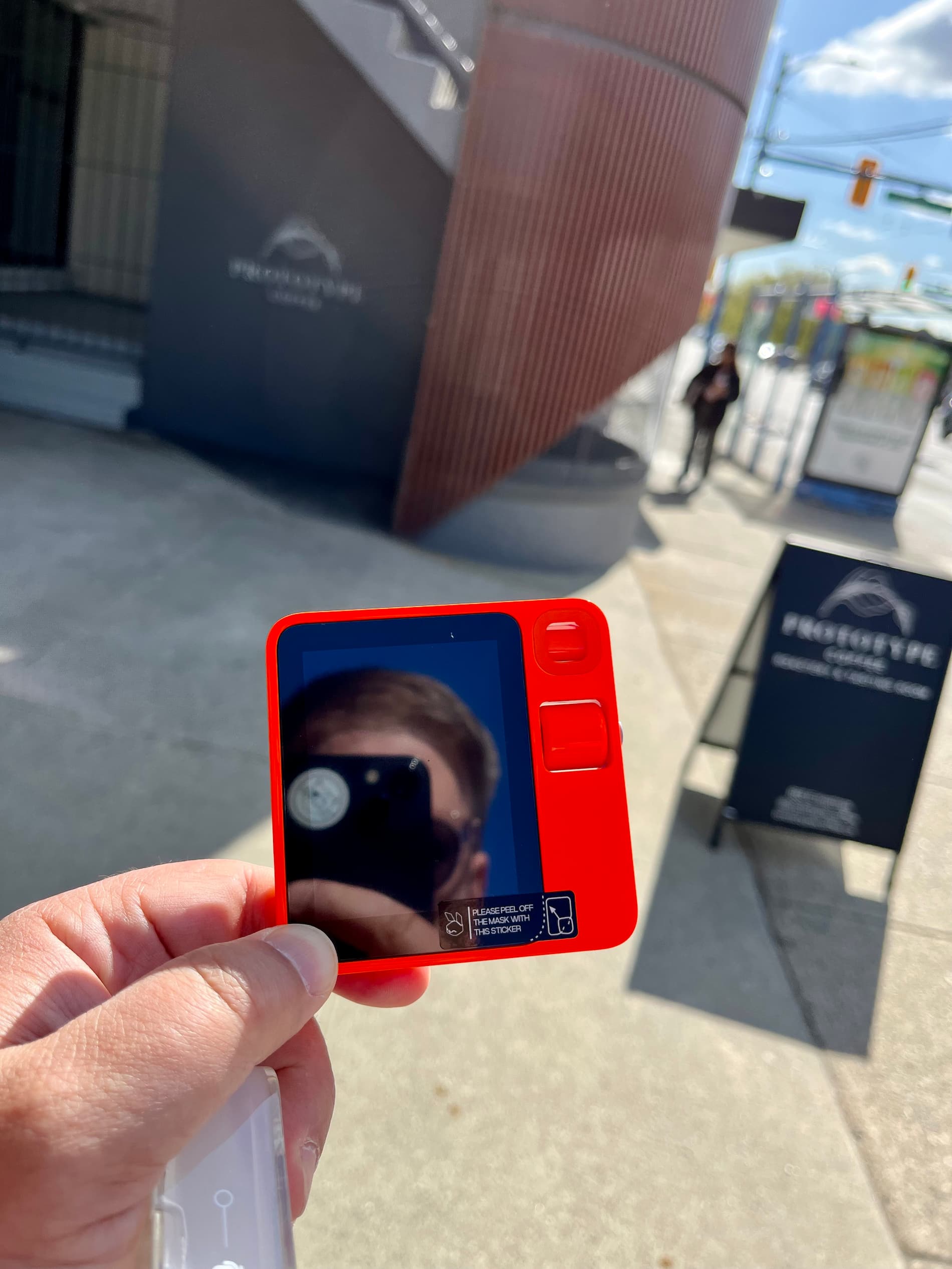
@mathewchaim on how we get to keep building the Internet. This really resonated with me:
we’ve been given the opportunity to keep building the internet
it’s not so much about building a new internet
it’s more that we get to keep on building the internet
because the internet essentially stopped being built
we arrived at a specific junction, put down our tools, and turned ads on to monetize what had been built
here we find ourselves in green pastures
where we can pick the tools back up
and keep on building this thing out
I got an email from LinkedIn telling me my account is 21 years old. Regardless of what you think of the platform, an Internet service sticking around that long is amazing in our current era of software building. I was user #1746 and waves of "social networks" were being launched in 2003, and I tried them all.
Had an awesome call with Yuni from MIWA Events this morning. I worked with her on lots of IPFS events over the past several years, and MIWA is her new independent event production company.
Met @neilsonks dropping by Z-Space today (he's an OG member here). He's now part of Open Souls, which you can find out more about in founder Kevin Fischer's video at Betaworks.
Discussing trade-offs between different protocols, the Matrix P2P work came up arewep2pyet.com/
A 2021 thread by @heyellieday on “proof of fidelity” instead of proof of human: we want non-human actors like squads or communities to be able to act as agents.
Updating my profile on the CalDotCom booking calendar I self host on Commons Computer and once again really impressed at the feature set. Next up: DailyCo as Zoom replacement (this powers Cal Video).
Long thread by @maegul@hachyderm.io on if posting Ghost and Wordpress blogs into ActivityPub microblogging makes sense from a UX perspective.
If I were Ghost, I’d add a default “Ghost account”, as well as enable per site AP server — active sites would be more like Reddits.
The Notes vs Article Activity Vocabulary types and how they look like in different clients has barely been touched.
Stephen Wolfram writes about the ChatGPT integration with Wolfram Alpha.. I have been wondering about this sort of “fact engine” integration. As LLMs get used for search, you’d prefer facts for the factual parts ;)
I added a few notes to Feedback on Federating Ghost on how this could be done using ATProtocol.
One idea I think is novel that I wrote up in more detail: Bluesky Custom Feeds for Premium Content
Going through some open tabs and made a bunch of updates. Now took myself to the coffee shop to work on some blog coding.
Custom Frames Support
I added Farcaster Frames support to the site, using just default settings similar to what is already inserted into page headers for OpenGraph.
Using the Ghost page as an example, I'm modifying the head template so that I can put in custom frame data per notes page.
frame:
image: /assets/2024/ghost_logo_black.jpg
image-aspect-ratio: "1:1"
button2:
label: "Github"
action: "link"
target: https://github.com/TryGhost/Ghost
button1:
label: "Home"
action: "link"
target: "https://ghost.org"
Obsidian doesn't support these kind of nested header properties, so I need to do it in source code view.
Yes, there would be some way to create this in a way that loops through a button array.
Canonical Link
I take notes on articles. I keep a local copy of the article and capture when it was published, who the author was, and usually clip some quotes and make some comments of my own.
I want people to go read the original! And I don't want to "steal" search traffic or attention from the original. In fact, I want to boost it! Reading Wikipedia on the canonical link, this not really what it's meant for.
Regardless, adding some header meta data. This is the part of thinking for Community Search Engine that has to happen.
Articles Page
Turns out I had an unfinished articles page! Fixed a couple of things with it, including getting year sorting done correctly. Design of it still needs a lot of work.
Code Page
Let's make a page with all the notes that have a code repository / git link! Here's code.
Oh fun, of course I have some people entries, and if I have their Github profile filled out, they'll show up on this page.
There aren't that many entries on here because I have more in the old Logseq notes with github and git properties.
And separately, I'd like to capture my 1.4K starred repos on Github. The "signal" of me adding a notes page is stronger than "merely" starring on Github, but it should at least contribute to a personal search index (which again leads into Community Search Engine too).
Excerpt for Journals
This is a very long journal post! My RSS automated cross posting with Fedica would attempt to turn this into a very very long set of threaded posts.
I'll add an excerpt field which will get used in the RSS feed if it excepts.
{% if post.excerpt %}
{% assign description = post.excerpt %}
{% else %}
{% assign description = post.content %}
{% endif %}
Matthew Bogart writes up his thoughts on how Ghost might join the fediverse.
The “new blog post” short note vs “full post” federation is an interesting one.
I do think full post is the most interesting (there are many ways to cross post new blog post notifications already).
ActivityBadges extends Open Badges with ActivityPub support.
Seen via @mapache@hacyderm.io
Just read David Phelps’ Proto-App Thesis aka “Protocol Apps”.
It matches a lot of what I’m thinking, except I think apps will build on top of ActivityPub, ATProtocol, or Farcaster. I’ll collect some thoughts at Proto Apps.
Clew is an independent web search engine “focused on writing by independent creators”.
Tailscale posts about fixing their pricing so that everyone can use OIDC-compliant SSO on any plan.
This sentence about their mission stood out:
Our mission at Tailscale is to build the new internet, and we take a strong stance that the next internet has to be secure by default.
I wrote up my notes on what I submitted to the Ghost survey: Feedback on Federating Ghost. I truly believe that any app that cares about user interaction should look to federate beyond a single install.
John O’Nolan, founder of Ghost, makes a post asking for feedback on federating Ghost with ActivityPub. Please share what you write in the survey!
Ben Pate has posted a demo video of a federated Bandcamp, built using his ActivityPub “Social web toolkit”, Emissary.
Paul Frazee shares a few thoughts on paying for email to stop spam. This is of course purely in reference to email. Not to any other kinds of posts.
Chris Riccomini PostgreSQL Extensions or Protocols: Architecture Roulette - I feel like a lot of early open source is now exploring the protocols vs platforms space. Including “de facto” protocol status.
Gordon Brander writes Decentralizability:
“Immutable data, universal IDs, user-controlled keys… and just using HTTP. I think this is probably minimum viable decentralizability.”
Pretty close match to my definition of Web3.
Kneeling Bus’ Brazilianization of the Internet is an important read. I need to think about how my Community Search Engine exacerbate “enclave-gated internet” spaces.
Ken Kantzer writes “GPT is the Heroku of AI”:
“a very, very expensive way to do ML features without needing an ML team. It’s actually not even that expensive compared to the value, but it is expensive compared to cheaper locally run LLMs and using a traditional ML model, once it’s been trained.”
Ivo Velitchkov @kvistgaard talks about what he’s missing from the reMarkable:
- Export of highlights from PDF and EPUB
- Links between notes and related to that:
- Persistent IDs of every object (note, notebook, folder, tag) so that they can be referred to from other places and opened up in the desktop or mobile app.
Strong agree!
“Computation is the medium of our lifetimes - it’s not just a technical medium but a cultural medium as well. We should explore the culture of computation” by Myron Krueger, as said by @zachlieberman
Matt Roberts writes “Who killed Canadian Venture?” digging into the history of Canadian pension funds and RRSP investment rules.
TLDR In the 90s, 80% had to be Canadian. In 2003, this was changed to 70%. And then, in 2005 — no Canadian investment minimum.
One of the things I did during Vancouver Hack Day was set up a Polis poll around DWebYVR / Vancouver tech topics. It's a way to gather feedback while also mapping consensus or differing opinions.
More setting up my Z-Space desk. Using my RK71 keyboard, configured using Karabiner Elements and downloaded bbeerr's RK61 scripts to have an escape key as well as backtick and tilde keys.

I bought a few things for my desk at Z-Space, including this j5create docking stand and mini dock.

Ubicloud is “an open, free, and portable cloud. Think of it as an open alternative to cloud providers”.
Open source AGPL that you install on bare metal servers to run your own cloud.
Chad Whitacre: Open source is not a grocery store (pay first), not a soup kitchen (not charity). Open source is a restaurant (eat your meal with others, then split the check).
Glyph writes Software Needs To Be More Expensive, mostly suggesting that low barrier “let engineers expense $50 per month to any open source project” could help.
The underlying intent is what I’d like to promote: pay to support software you care about. From end users to developers, this can be promoted.
It can fit alongside current real world movements to “buy local”.
Ian Vanagas writes Smart Young BC. He's starting to write some screenshot essays with great Vancouver Tech content, like this one on crushing silos.
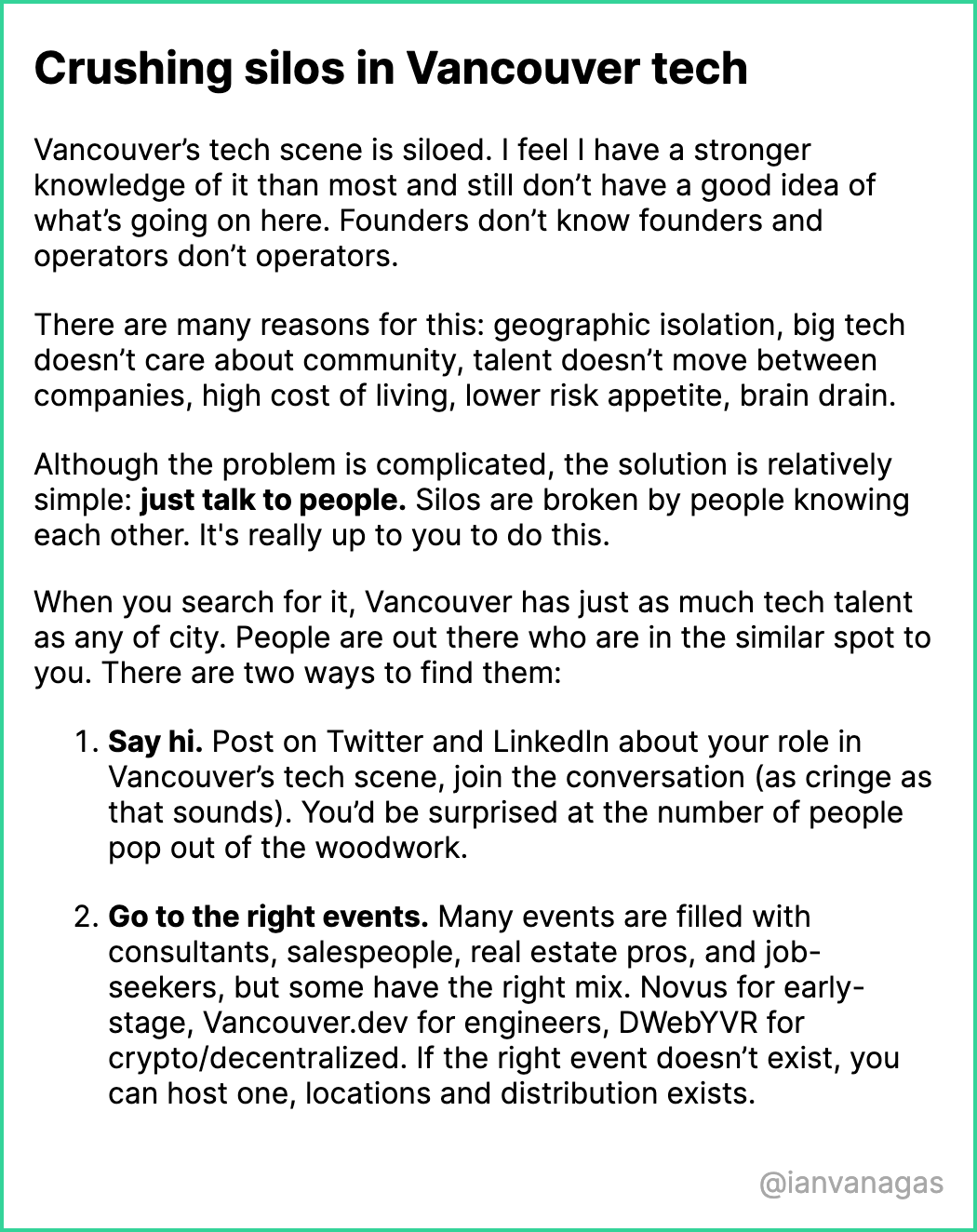
OK, went ahead and figured out a date with Orion: Next Tools for Thought Rocks will be Wed, April 17th at 8am PST.
Jamming with Orion Reed. Going to host his Causal Islands LA talk at an upcoming Tools for Thought Rocks event so we get a recording.
And I think it’s time to work on TiddlyWiki style drag and drop. I’ll post some background thoughts at Note Clips.
Demo video of live setup of Co-op Cloud stack with single sign on with Keycloak and running Matrix, Hometown (Mastodon fork), and Nextcloud.
I’m helping to organize a Vancouver Hack Day this coming Sunday, April 7th, 2024.
Get a quick overview of some interesting tech, including ATProtocol, Everywhere Computer, Local First, and Enhance. Then spend the day learning and coding, or bring a project of your own. Demos end of day.
Substack introduced a “Follow” feature that makes it more like a social network destination rather than a newsletter / blog platform.
And they don’t share follower email addresses with authors.
Yet-another-proprietary-social network. Yes, I told you so.
Write up on The Wrap
Chad Whitacre on the Redis re-licensing:
“For a relicensing to be a rug pull, there has to have been a true developer community around the project—not just users, developers.”
Also has a graph showing Sentry (where he works) being almost completely company maintained.
Did a quick test of the whtwnd ATProtocol blogging platform. Made by @knksm5.final-techblog.com:
“The body of blog articles is stored on your Personal Data Server (PDS) and is not saved on WhiteWind servers or the like, and viewers retrieve articles from your PDS.”
Ana Hevesi from Uploop posts a fire article Stop wasting time on community:
"…today’s leaders can build followings at scales that were once the exclusive domain of religions and nations."
Ana says: get serious about defining and serving your extended constituencies.
Daniel from Bluesky goes through the evolution of the network to today’s federation.
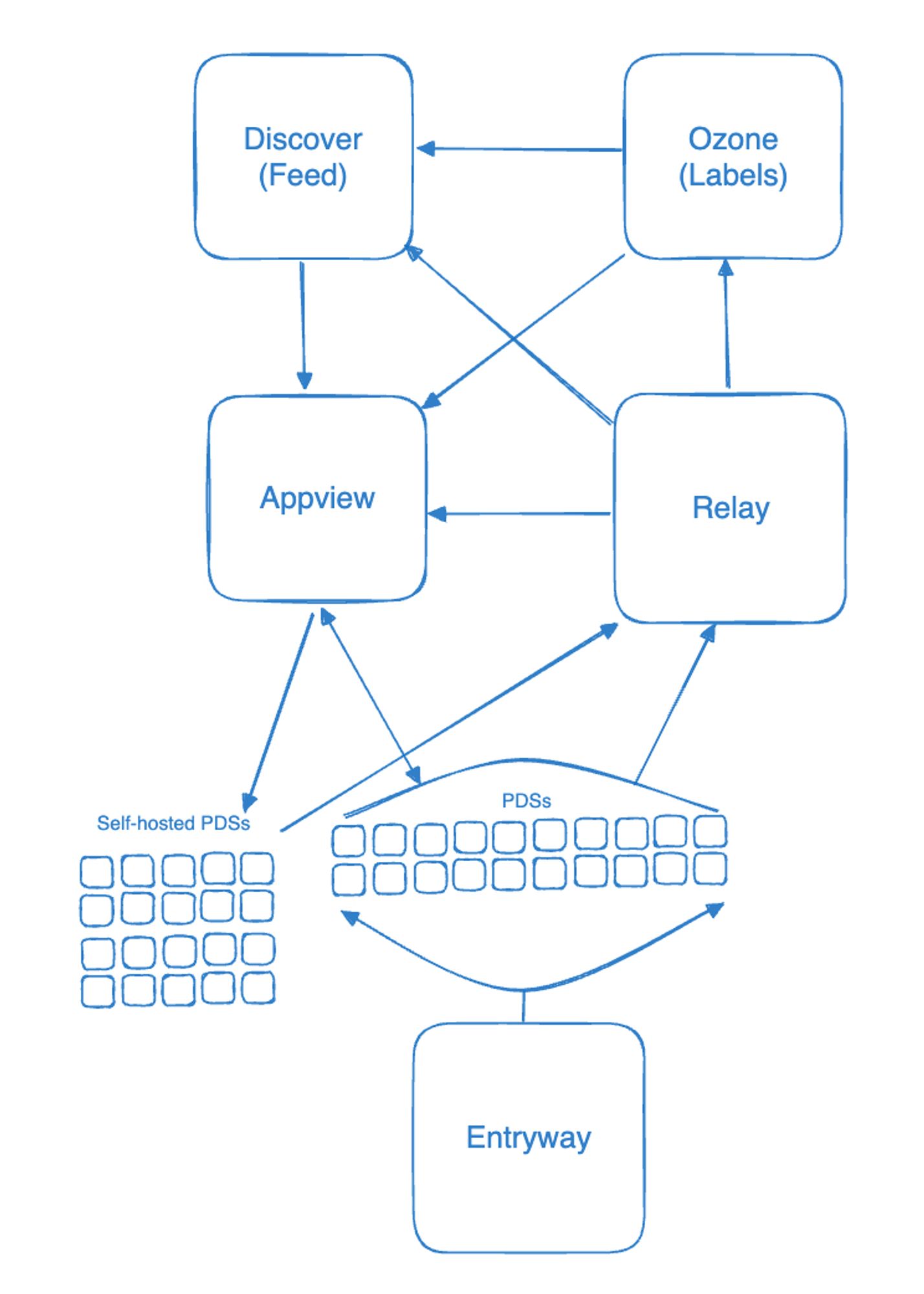
Old blog post by Moxie on the Signal blog on how open-ended protocols stall.
Surfaced by Gordon Brander, “innovation by definition is not standardizable” — ecosystems move too quickly as they first emerge.
I just signed up to rent a desk for 3 months in a shared space in Vancouver. I'm going to try getting out of the house regularly, it's a cool space I want to support, and it's got some event space that I'll use for some upcoming things.
New note for Universal Blue: using containers as the basis for a desktop OS. "That's nerdspeak for the ultimate Linux client: the reliability of a Chromebook, but with the flexibility and power of a traditional Linux desktop"
Bazzite is a Linux distro for gaming with Steam support out of the box.
Web Recorder actually records websites so they are replayable rather than just a static archive.
ParadeDB “a modern ElasticSearch alternative built on Postgres and Tantivy, in Rust”
Radicle has reached v1.0. It's a "distributed code collaboration stack" – local first nodes that connect p2p and stores everything in git, identities are DID-based Ed25519 keys.
Uncut.wtf is "a free typeface catalogue, focusing on somewhat contemporary type. There are currently 152 typefaces featured"
via @depatchedmode, we're using Overused Grotesk at Fission.
Doing Weeknotes, by Giles Turnbull: “Weeknotes are a format for regular communication about work in progress.”
via Ben Werdmuller
I kind of hate this Fast Company review of the 2024 MacBook Air called “Dawn of the AI laptop” — but it’s the label that’s selling laptops today. Without “touchscreen capability, fancy rotating hinges, folding screens, or other features” that PC manufacturers are attempting.
I took some downtime this weekend and played many hours of Caves of Qud, an RPG / roguelike that has a vast world and many commands and abilities.
Found myself searching a lot of basics, like "How do I fill a waterskin with liquid?", and deciding how many arms and legs I wanted my mutant character to have.
…is a Deno/TypeScript library for building federated server apps powered by ActivityPub and other standards
Still in early development. Also using Deno’s new JSR packaging format.
It's been 20 years, and I brought Zoe up in conversation again: a local IMAP server on your Mac that gave you an interface for exploring, searching, and working with your email. I've added a notes page for it.
I recently installed Telegram desktop to my Mac. The disk image has this really cute illustration in it.
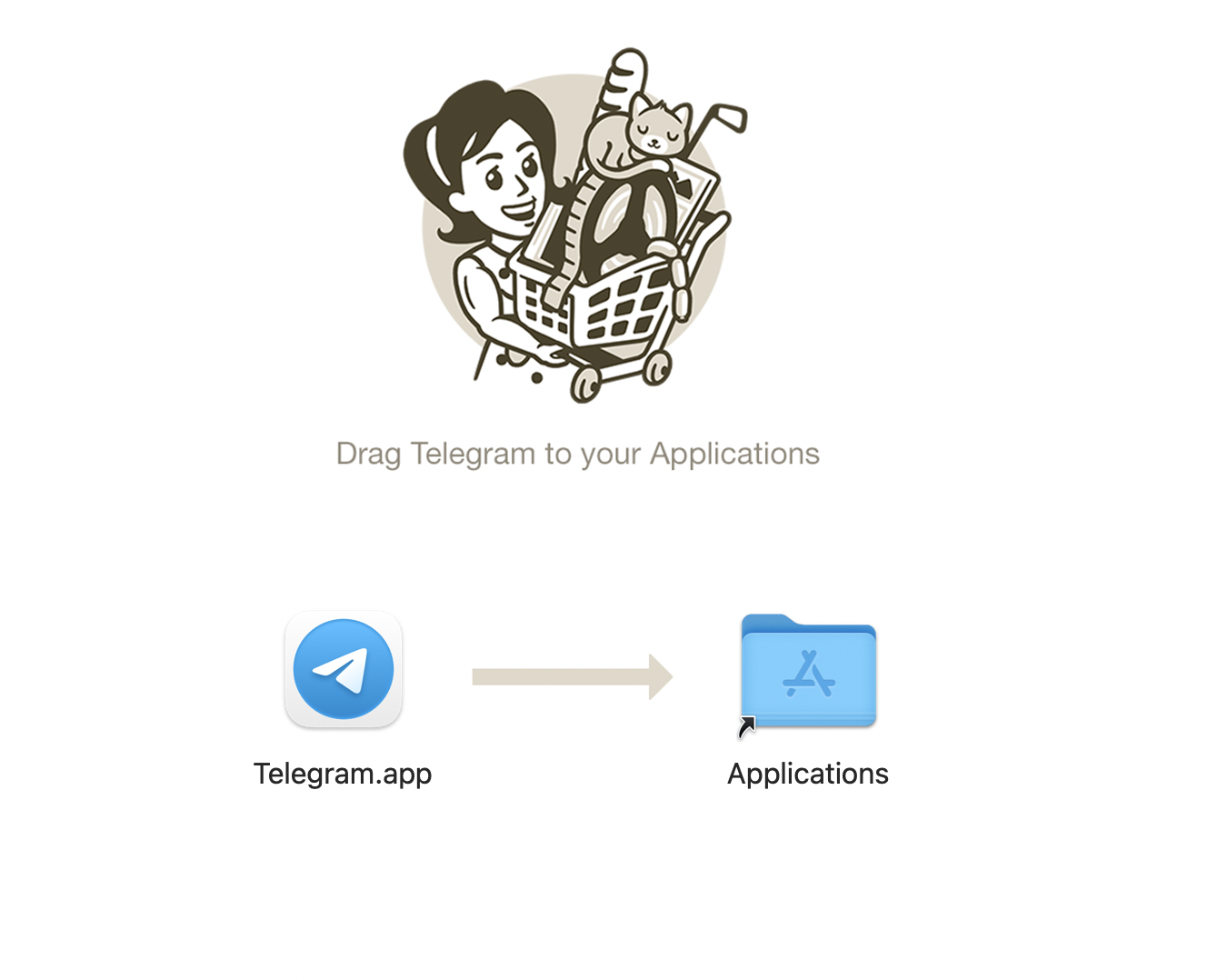
Supernote is an e-ink tablet that is currently Android 11 powered but will have a customizable & open Linux release. $299USD per-order, plus you’ll need a $~70 pen.
Gitlab has a backlog item for enabling ActivityPub support. There isn't a lot of consistency in this stuff yet, don't know if they'll confirm to what ForgeFed is designing, or just aim for "can subscribe in Mastodon" (really, they should be supporting both).
Talking about Ente, it turns out people are interested in solutions for Photo Sharing, so I wrote up a notes page about some apps that I know of, and what I currently use.
ForgeFed is a project to work on federation for software forges, built on top of ActivityPub:
“imagine you could host your Git repos anywhere you want…but still be able to open issues and submit pull requests against repos hosted elsewhere”
Threads is rolling out a beta of user accounts opting in to enabling federation. Evan Prodromou announces he is part of the beta @evanprodromou@threads.net
Added a notes page for Stewart Brand's Pace Layering concept. "The fast layers innovate; the slow layers stabilize. The whole combines with learning continuity"
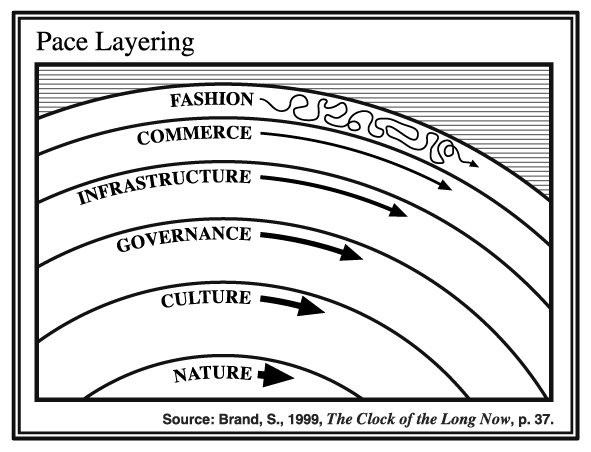
Ente just announced open sourcing their full backend.
It’s an end-to-end encrypted “alternative to Google or Apple photos”, licensed as AGPL.
Their client code had always been open source, this completes making the entire service available.
Apple released a game porting toolkit that has been improved by Whisky:
app that wraps both Wine, the tool that translates Windows API calls to their Unix-like equivalents, and Apple’s game porting toolkit into one very friendly interface. That removes pretty much all of the work out of the process, to the point where all I had to do was download Whisky and drag it into my Applications folder.
Dan Moren writes at Six Colors that maybe Apple should make running PC games on MacOS great with this method.
@alex@social.alexschroeder.ch made a theme for his site that makes it look like chat threads. It’s powered by his very interesting Oddmu wiki / memex.
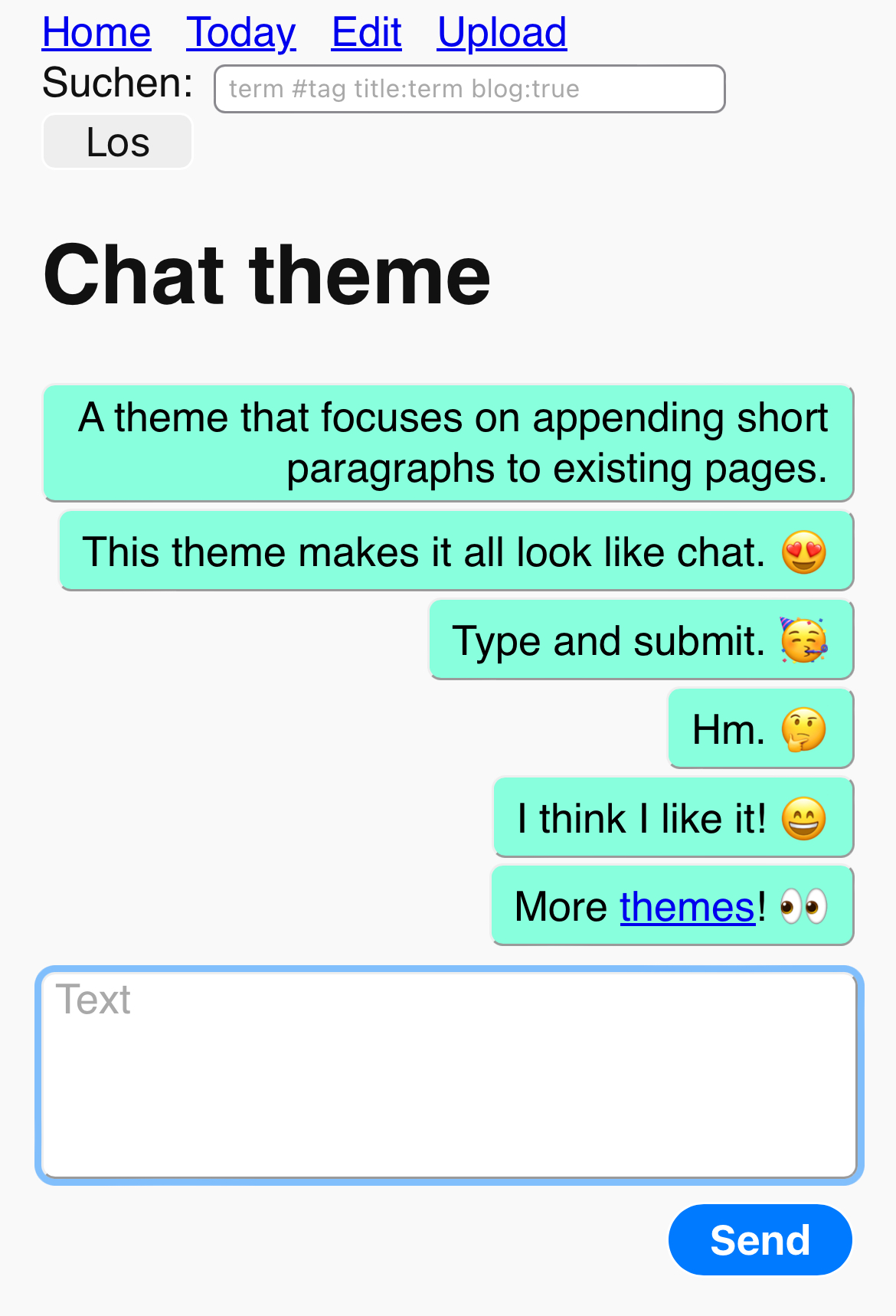
Ben Werdmuller is adding asides posts which are pretty similar to how how I think about my journal post types.
This is the longest time I haven't posted journal updates in a while! Still at EthDenver until Sunday, maybe I'll put some notes on that EthDenver page. I've got lots of tabs open from the people and projects I've met.
And lots of progress in inviting people to Causal Islands
Landed in Denver. I’m here for the week attending EthDenver and the many community side events happening. Talking to people about Fission’s Everywhere Computer.
I think the word bridge is now at the level of trigger word for people.
What if I call Misskey a bridge to Mastodon?
It means something socially and technically to some group of people which is disconnected from how it works.
Networked communications are absolutely social discussions — not just tech.
But if you disregard how the tech actually works, you’re not going to get very far with social discussions either.
Steve Klabnik writes up his own take on How does Bluesky work
I think the separation of concerns between atproto and BlueSky are very meaningful, as having a “killer app” for the network gives a reason to use it. It also is a form of dogfooding, making sure that atproto is good enough to be able to build real applications on.
Rui Carmo writes up his experiences with LLMs etc in Living with our machine sidekicks. Here’s his comment on trying to import his 20 year old digital garden:
In my experience, summaries for personal notes either miss the point or are hilariously off, suggestions for related pages prioritise matching fluff over tags (yes, it’s that bad from a knowledge management perspective), and “chatting with my documents” is, in a word, stupid.
Congrats to the Bluesky team on opening up federation yesterday! Read the blog post announcement
I almost got a PDS up and running yesterday for my birthday.
I’ve been talking to Nathan Schneider and Robin Berjon about running a co-op PDS, Sky Coop.
Manton from Micro.blog intends to enable the service as an ATProtocol PDS:
The long-term plan for Micro.blog is to fully support AT’s PDS — Personal Data Servers. Any blog hosted on Micro.blog would plug into Bluesky seamlessly, with data portable to other AT Protocol hosting providers.
Micro.blog already functions as an ActivityPub server, and currently supports cross-posting to Bluesky.
Following on Paying people to work on open source is good actually, Chad Whitacre proposes Software Commons as the big tent definition of open source in his post Towards Software Commons.
From the Wikipedia definition:
The software commons consists of all computer software which is available at little or no cost and which can be reused with few restrictions. It includes open source software which can be modified with few restrictions. However the commons also includes software outside of these categories
I like it!
Blog tinkering on my birthday ✅
The aliases field in notes are now used to generate the lines of the IPFS _redirects file. View source on Github
There are 14 JavaScript runtimes, via @wesbos.
This was a glitch post that I didn't end up publishing, but the link made it through my RSS pipes and got posted. So I'm retconning the link that got posted.
Let's make a JavaScript Runtimes notes page for this info to live.
Rosano writes an encryption rant as he attempts to backup and transfer data from a handful of apps:
there's no feigning moral superiority in using 'alternative tech' until it includes a real foundation to stand on for people without this domain expertise.
Bryan Cantrill, CTO of Oxide Computer, Moore's Scofflaws:
software costs can potentially absorb the entire gain from a next-generation CPU…software vendors never would have been allowed to get away with charging by the gigahertz; we should not allow them to feel so emboldened to charge by core count now!
Signal is adding usernames to protect visibility of phone numbers. Usernames are effectively a privacy work around, not a social feature:
Signal usernames are not logins or handles that you’ll be known by on the app – they’re simply a quick way to connect without sharing a phone number.
They also go on to describe that they’re easily changeable/disposable to share with different groups over time.
The Signal Wiki documents the generation of nicknames and UUID-based links (links don’t publicly display your username)
“We have lost the ability to do RAD (Rapid Application Development) due to the prevalence of web applications” says Rui Carmo.
He has a page collecting his research on Native Development
Apple detects Mastodon with a link tag — but then still uses OpenGraph to load the preview for iMessage. Any app that has a Mastodon shaped link tag can thus get rich previews.
Deltachat blog post about updated webxdc docs and sample apps
Like Farcaster#Frames|Farcaster Frames, webxdc “messenger apps” are interesting to me as it combines distribution with new app functionality.
Tom Critchlow writes up notes on his Remarkable Tablet. I have a reMarkable tablet myself and think Tom’s suggestions are pretty great.
I’d also love a more formal diary / daily entry system. Kind of like Obsidian’s daily notes. Some kind of date-based notebook inside the Remarkable would be rad
Notes, daily entry, and sync as core primitives are very powerful.
I pre-ordered a stealth tablet a couple of years back and then wrote a post about Kickstarting an app ecosystem which suggested similar things.
Apparently reMarkable is only getting more tied to mandatory, single source subscription services, which is not a great way to build an ecosystem around a device.
The Polkadot ecosystem has defined salaries and grades for fellowships. Via Dietrich, who put together background context on Parity/Polkadot decentralization.
Fits my open source as a job thinking, and is roughly what I suggested when I was working in the Ethereum core ecosystem: $10KUSD per month is a decent engineer salary.
I spent way too much time this past week being annoyed and disappointed at the hate thrown at Bridgy Fed developer Ryan Barrett, connecting ActivityPub to Bluesky’s ATProtocol.
Sean Tilley has a great opinion piece on We Distribute that does a good job of summarizing.
OWA on Apple killing web apps in the EU
This feels … complicated. There are new browser engines allowed in the EU.
You can still have a Home Screen “bookmark” & it will open in the browser of your choice.
Any of the new browsers — including Chrome or Firefox — could be a great host for PWAs on iOS now, decoupled from Safari versions.
Jacob Kaplan-Moss writes Paying people to work on open source is good actually which very much matches my thoughts so I’m clipping it to my local notes.
I’ll share a handful of quotes:
“Yelling at maintainers who’ve found a way to make a living is wrong.”
“Open source is good for humanity…I want people who want to work on open source to be able to do so, and should be able to live comfortable lives, with their basic needs met.
I’ll even use the terms “open source” and “free software” interchangeably just to hammer home how, in this context, the precise definitions of these terms don’t matter to me
One of the core things that I’m ready to fight for alongside Jacob is that “lower case” open source should be a bigger tent than OSI-approved Open Source™️ licenses, and it’s what I mean when I use the term.
if my sloppy use of these terms bothers you in the context of talking about how people make their living, it implies that you care more about terminology and definitions than about the people, and I’d like you to sit in that discomfort for a while
Read the whole thing.
Great read about the recent Mastodon CVE (which could allow taking over and forging content for remote accounts).
I’m quoting a bit here about open source:
how people seem to only care for the 'gratis' of free software, and seldom the 'libre', and millions of users leaning on the work of primarily a couple developers, assuming they have the attentiveness to catch every mistake themselves alone
There aren’t enough funded people - both teams and individuals - working on Fediverse software, and both the users and the admins seem averse to paying for it.
Ink & Switch lab notebook for new Patchwork project. First post, Universal Version Control:
“We believe that simple, powerful, universal version control tools could help all kinds of creators produce better work. Perhaps this is even built into the storage layer of your OS! That’s the vision for this Ink & Switch research project, codenamed Patchwork.”
Oh look at this! Just found out that Ton Zijlstra is involved in PKM Summit 2024 (aka Personal Knowledge Management, aka Digital Garden / Second Brain).
Late March in Utrecht, NL, around the same time I’m planning Causal Islands LA.
Dare Obasanjo says paid subscriptions to websites creates a global divide vs ad supported:
“Online advertising is a progressive form of taxation as the rich, mostly US-based consumers who buy goods & services from ads subsidized the internet for everyone else.”
@carnage4life@mas.to
90.63% of pages get no organic search traffic from Google, via ahrefs 59 blogging statistics for 2023
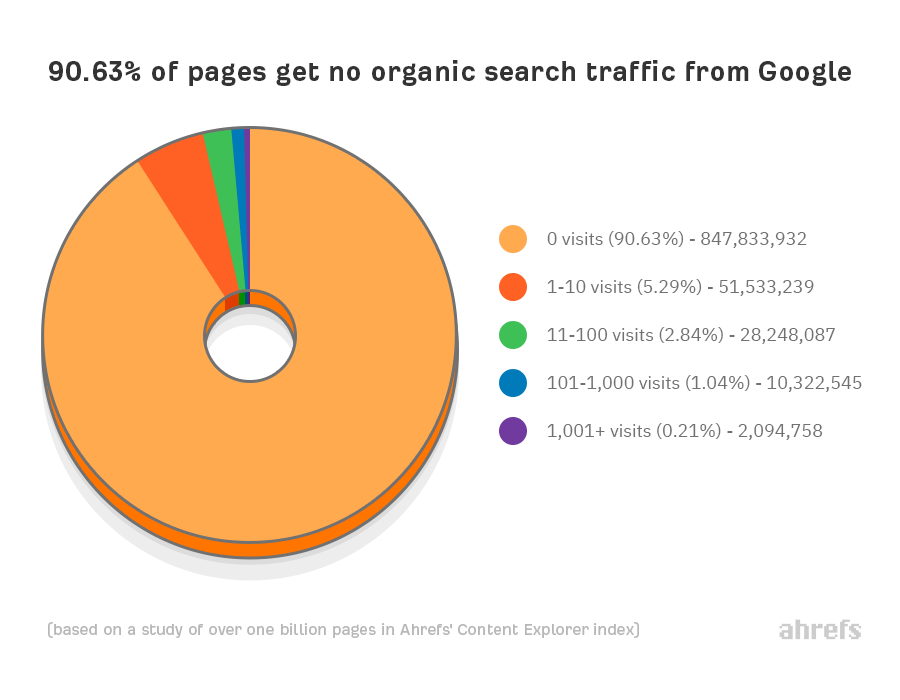
I’ve been reading lots of Apple Vision Pro reviews and chatter.
I spent several years working in AR/VR/XR and tinkered with hand input + interfaces. We knew that mobile OS powered headset was coming from Apple.
Then I watched Apple evolve their UI on Mac and iOS for years, that pointed without a doubt to not being bounded by a screen.
“I say this carefully, because I don’t wish to offend. But if you haven’t used Vision Pro, you probably shouldn’t be writing about it.” – Joe Cieplinski
I’ll get one when they’re available in Canada. Or, uh, maybe on my next trip to the US 😅
I added Networked Orgs and Tooling as my first retroactive blog post. It didn't feel enough like a note, so I formatted and integrated a few things and published it as a blog post.
Stract, an open source search engine:
”where the user has the ability to see exactly what is going on and customize almost everything about their search results. It's a search engine made for hackers and tinkerers just like ourselves.”
404 Media, This Guy Has Built an Open Source Search Engine as an Alternative to Google in His Spare Time
Collective Governance Directory:
A collection of links to publicly available governance documents, published by the collectives that use them.
Launched by Doug, who is looking for other collectives to contribute their docs.
Bluesky handles directory lists a breakdown of custom domain names used as account names on Bluesky.
“Just enough leadership injected, when it is needed, where it is needed.”
vgr writes a post on a Management trend he’s seeing, that he calls BDFx-ing.
BDFL (Benevolent Dictator For Life) is a common governance model for many open source projects.
I have a Twitter archive powered by Tweetback. There are apparently 68 Tweetback Canonical archives registered, which will link to the “canonical” URLs of each others archives.
I think Mastodon or Bluesky import is a more likely path for people who really want their archive online.
Bluesky, which will support running your own PDS, seems like a good architecture for this.
Peter Kaminski, Books and NeoBooks
The idea of NeoBooks was never to be about one particular kind of object. It’s about how to use the techniques that we have, social techniques and informational techniques, to help people publish.
I’m getting all nostalgic reading my own blog posts from 20 years ago.
(1) because it was the beginning of being part of the growing Vancouver tech scene; and,
(2) I have 20 year old blog posts still online!
Here’s the IPFS index of my posts from 2004, which probably means they’ll stick around for another 20!
20 years of Flickr. And I just happened to tell the story today of the tech meetup I organized in Vancouver 20 years ago. 6 people came, including Roland Tanglao, who got us all early access to Flickr.
I still have the blog post from the Vancouver Geek Dinner. And some notes on that early full screen Flash-powered version of Flickr. And some sort of Flickr Buddy Icons that still works 20 years later.
“Wherever you get your podcasts” is a radical statement, Anil Dash:
“being able to say, "wherever you get your podcasts" is a radical statement. Because what it represents is the triumph of exactly the kind of technology that's supposed to be impossible: open, empowering tech that's not owned by any one company, that can't be controlled by any one company, and that allows people to have ownership over their work and their relationship with their audience.”
I’m looking for more radical statements.
Next in the tiny hardware series: I bought an ASUS MiniPC PL63. It was on sale, and I wanted a machine that sits at my desk with modern ports.

Brett Cannon, Python core dev:
“When you say or ask for something regarding open source, add "for me" to the end of the sentence. If that makes it sound rude, then consider rephrasing.
Had a great morning at DWebYVR coworking.
We ended up on the top floor of the VPL Central Library and had a bunch of interesting discussions that you can find on the notes page.
The developer of the Graysky client for Bluesky has written up how to embed replies from Bluesky as comments on your blog.
Like I said for Mastodon comments, not going to enable this on my site.
Craig Mod writes "Oh God, It's Raining Newsletters" (2019), which is a delightful piece of writing with many links that you should read in full, but I will quote a few snippets:
"I fear we’re entering an era of newsletter fatigue…" "the state of newsletters and email, in 2019: Things are unexpectedly amazing" "there’s something about the framing of email — the inbox, that weird neither-here-nor-there networked space" "These newsletters are the most backed up pieces of writing in history, copies in millions of inboxes, on millions of hard drives and servers, far more than any blog post." "They’re everywhere but privately so, hidden, piggybacking on the most accessible, oldest networked publishing platform in the world."
via nicoth
Changed the Fedica settings to crosspost to my main Bluesky account @bmann.ca rather than the @bmannconsulting.com account I made. I think I liked the concept of mapping my domain to it's own username (and the FoodWiki has an account too), but it really just is "me". The three Mastodon accounts are also a bit much 😅
The late majority needs nothing to change. Early adopters move on to systems where the “new stuff” is available.
I created the /management channel on Warpcast, goaded on by VGR.

Right now, I pay for two open social protocols. For ActivityPub, I pay for my own servers (hosting) and clients (Ivory). For Farcaster, I pay for invites and channels.
ATProtocol, I need Bluesky to get off your butts and launch federation to enable various people to start charging for things.
As of iOS 17.4, iPhone users in the EU can choose a default browser, details from MacRumors:
Apple said iPhone users in the EU will be presented with a list of the 12 most popular web browsers from their country's local App Store at the time
Take away: a lot of browsers will be competing for App Store installs.
DREAM - Distribution Rules Everything Around Me
Distribution is the product of next gen social protocols, and why app devs are building in support as search and platform social crumbles.
Three quotes from “The Internets Meaning Crisis”, by Kneeling Bus:
The average human living today sees more things they don’t care about in one week than a medieval peasant did in their entire lifetime.
Parasocial media as antidote to AI content:
As AI normalizes the idea of human-free content creation, parasocial media merits appreciation: We gravitate toward work that foregrounds its creator because that person is often the ultimate reason we’re interested in the work, directly or indirectly
Increasingly baroque personal info filter systems:
It’s increasingly urgent to develop an effective personal system for keeping the digital entropy at bay, even if it’s as simple as “haphazardly ignore most of what comes through.”
We’re in the middle of a perfect storm for rollback of the ‘open web’ and burgeoning online surveillance” — that’s just the title of Alec Muffet’s post. He details a long list of issues, with everything from politics to lack of digital literacy by both activists and regulators.
We are in for a rough few years. There will be losses. The “app” ecosystem will likely take a big — possibly majority — chunk out of the “open web” as users demand features which are more easily built without the abstraction of traditional web/web-like services.
Finishing with:
The users will suffer in the middle of this Godzilla battle, but nobody cares about them.
And actual privacy and anonymity will be on the back foot for a decade or more.
Oof. I’m feeling this but don’t want to believe it.
I post about Garage, and then sbc64 follows the links and comes back with wgautomesh, a tool by the same team:
“A simple utility to help connect wireguard nodes together in a full mesh topology”
Excellent! May be useful for some work at Fission.
This FOSDEM talk on Domain: a modular Rust DNS toolkit looks interesting:
The "domain" crate is a Rust library that aims to provide a wide range of building blocks that are necessary or useful when building specialised DNS applications.
In this talk we will look at the history, current state, and future of the crate and how it differs from other offerings in the Rust ecosystem. We will explore how the crate aims to leverage Rust’s type system to make it easier to model the complexities of the DNS in a straightforward way that helps make it easier to build correct and efficient applications.
On GitHub NLnetLabs/domain
Chad Kohalyk writes about fun:
Basically, the most important thing for peak performance is energy. And the way to generate energy is to make sure there is enough FUN in your life. Then you will have the fuel to lean into whatever the problem of the moment is.
Chad works with me at Fission. I’ve been thinking about this a lot in all areas of my life, from work, to community, to family, to individual.
For me personally, I need to have high alignment between what I’m interested in and what I do for work. So I’ve often created my own work to ensure that alignment.
The downside of blurring of lines between stuff that is being done for work, and stuff to tinker with for personal enjoyment.
The Tangara Music Player campaign opened on Crowd Supply today. Yep, I ordered.
I care more about apps, protocols, and files than operating systems.
But plumbing and sewers are important.
It’s the first anniversary of CoSocial.
This is the first co-op I’ve been part of, although I’ve been involved in a number of other non-profits, foundations, and other structures.
I’m gathering, learning, and sharing more info on my co-op notes.
Matthew Ingram writes a post mortem on The Messenger news startup:
The saddest part of this whole saga, as Simon Owens noted, is that the $50 million Finkelstein and his team chewed through could have funded a hundred local news startups that people might actually want or need.
I’m a big fan of the “fund a bunch of smaller attempts”. Knowing when to favour that vs fund the larger impactful thing is hard.
Oxide Computer has released Helios, a distribution of illumos that powers their Oxide Rack computer.
Garage “An open-source distributed object storage service tailored for self-hosting”. S3-compatible API, single Rust binary that is installable everywhere.
Steven Sinofsky writes about Apple and the DMA in “Building Under Regulation”:
As I read the over 60 pages of the DMA when it was passed…my heart sank over the complexity of a regulation so poorly constructed yet so clearly aimed at specific (American) companies and products.
It’s a long post and Sinofsky has a lot of relevant personal experience here. I’ll likely clip the article and look for some more quotes and take aways.
The Open Web Advocacy group has posted a statement on how Apple is complying with the DMA “Apple’s plan to allow browser competition dubbed unworkable”
Bruce Lawson makes a personal post on “malicious compliance”.
This article “The Negative Impact of Mobile-First Web Design on Desktop” feels like the reverse of what we would have seen 10 years ago, complaining about designs that don’t work on mobile.
The article states that 55% of web traffic comes from mobile. I bet if we measured “human time spent reading content” that mobile would be even higher.
This fits into my death of the professional desktop operating system theme. I think we should consider desktop design to be a luxury, for art and experiences.
We need more tiny knowledge projects
“I used to think of “knowledge projects” as involving a big mission, a big community, and a complex piece of software: the stuff of Wikipedia, Stack Overflow, or Genius (where I worked for several years). But the web is just as good for collaborations in the small.”
Law of VC writes about Simplifying the SAFE (posted in 2021), with his suggestion being “Remove the Valuation Cap and Discount. Replace it with a Conversion Percentage”.
Will Crichton proposes a portable EPUB format to replace PDFs.
If you click through the link, you’ll see that the article is a portable EPUB.
PieFed written in Python and Flask, AGPL-licensed, first class moderation tools. Project goal:
To build a federated discussion and link aggregation platform, similar to Reddit, Lemmy, Mbin.
Delta Chat blogged about their release of chatmail services – email services optimized for powering end-to-end encrypted chat like DeltaChat.
With some knowledge of DNS, SSH and a spare VPS (get the cheapest you can find), you can setup and offer chatmail services yourself pretty quickly. A friend easily recently set it up on a Raspberry Pi for his housing project. Chatmail servers are designed to run with minimal hardware requirements and to be easy to tweak even from novice sysadmins or programmers. No permission is needed from our side to run a chatmail server. We might not even know you are doing it because Delta Chat has no tracking or counting.
Visit the deltachat/chatmail repo for instructions on install and setup.
webxdc is a specification for embedding apps in chat created by Delta Chat. Shared with me by @fabrice@fosstodon.org.
Awesome to see Farcaster continuing to experiment with the launch of Frames.
Matches my thoughts on mobile form and social as distribution / discovery.
Farcaster has less usage than my other two protocol recommendations — ATProtocol and ActivityPub — but ability to align login / growth directly with app devs is huge.
Thanks @christina@social.coop for finding and sharing the term Knowmad, similar to Wildcard. Read Moravec's article and definition "Who are knowmads?".
Antikythera is "a think tank reorienting planetary computation as a technological, philosophical, and geopolitical force". They have a new working group starting up on Futures of Multipolar Computation. Multidisciplinary researchers are invited to apply.
Brought to my attention by @django@cosocial.ca's post linking to Michael Geist's article on Bill S-210, and that it may apply to the fediverse as well:
the unlimited scope of the Canadian law to sites such as Twitter, Snap, Instagram, Twitch and many others is no accident. If the lead lobby group behind the legislation gets its way, it is the stated goal of Bill S-210 to require all Canadians to undergo an age verification system in order to access content on general purpose sites with the threat of penalties and site blocking awaiting those sites that refuse to comply.
Ton Zijlstra blogs about Europe’s AI act being ready and points out that a lot of new acts got passed:
In 2020 there was no Digital Markets Act, Digital Services Act, AI Regulation, Data Governance Act, Data Act, nor an Open Data Directive/High Value Data implementing regulation.
Aaron Boodman @aboodman has a thread on fenced communities which I very much agree with and replied to him with a link.
Fenced community is my own term, from Open Source Licensing: restrict access to the scarce resources aka Common Goods of support, maintenance, discussion etc, but keep the code open.
Luis Villa is writing [Open(~ish) Machine Learning News]https://www.openml.fyi/2024-01-24/) and gives an update on what he’s going to cover:
less news, a turn more for the personal and the polemical: what should I do? What should our organizations and movements do?
I am also going to be watching open / licensing / AI, and work on running my own.
Great write up by Paul Frazee of “Why isn’t Bluesky a peer-to-peer network?”, going back to his own roots and the “2014 generation of p2p”.1
Bluesky is a sort-of-federated model. Here’s a succinct description:
It might be even more accurate to call this a Cryptographic Data Web. Every user's data repository is, in essence, a website. The aggregating applications are, in essence, search spiders. The Web never quite mastered structured data for a variety of reasons; the AT Protocol embraces it fundamentally. Rather than fetching views from sites, you fetch records from users. Our aggregators produce data indexes rather than search pages.
-
That’s 10 years ago and I think we’re still in the early days of distributed systems theory and cryptography being more widely known. The third innovation — seeing Bitcoin arise as a novel protocol — is shunned by many. ↩
An excellent long read by Rudolf Winestock, “The Eternal Mainframe”. It describes the cloud as a return to shared mainframes, the death of standalone “offline” personal computers.
True standalone personal computers may return to their roots: toys for hobbyists.
Fits my death of the professional desktop operating system hypothesis.
Tom Szilagyi writes “Ditching GitHub” — moving to self host his git repos, and welcoming email based git patches. This is not the last of these articles we’re going to read.
Ben Follington on the Subconscious team blogs on his personal site about “using Subconscious to design Subconscious”
So, how do you design feeling-first?
Yes. How does both user and maker take the digital tool into their hands.
A great read while also being highly personal about what Ben is aiming to do and be: “Metacognitive Design”.
The Perplexity AI summary of 'what is OpenStreetMap?' is pretty good. Cites sources and summarizes and synthesizes. I didn't add this to my notes entry for OpenStreetMap directly, but did link the source web pages and quote text from the sources.
Capturing a link to Obsidian Map View Plugin, since it came up in discussion. Open source, uses OpenStreetMap and open map tiles for search and display.
My exploration on Boris Map is mostly for FoodWiki purposes. I use basic tagging for notes pages if I want to capture e.g. that a person entry is in Vancouver.
The rebooting of social networks, blogs, and newsletters continues.
Spyglass is a link blog, a column, and a newsletter, all written by me, M.G. Siegler.
Brian Wisti @randomgeek@hackers.town documents using Obsidian + Hugo and a few other things in “Rebuilding My Public Brain”
We’ve been hanging out reading each others’ stuff on the blogosphere for a long time, nice to see what the neighbours are up to.
Beluga is an iOS app that lets you post microblogs. What’s unique is that it posts to S3-compatible storage, using your own credentials. Bring your own storage!
The Fediverse Report, created and maintained by Laurens Hof @laurenshof@indieweb.social, is doing a great job of sharing news, and also explainers like “How Bluesky works — the network components”.
Viverse, HTC’s metaverse open worlds platform, is going to be ActivityPub-enabled.
Their blog post “The Fediverse Explained: Social Media’s Next Form” is a good overview of fediverse history and apps.
Flaming Hydra is a collective of writers and artists. I’ve just subscribed to support them for the year.
a collective of 60 celebrated writers and artists joining to bring you an ingenious brief cooperatively-owned newsletter with short articles, essays, comics, commentary, and happenings
obsidian-export , “a CLI program and a Rust library to export an Obsidian vault to regular Markdown”
via @randomgeek@hackers.town
The Lenovo M900 Tiny arrived. It came in a big, long box, which turned out to also contain a full keyboard and mouse, plus lots of packaging around the machine, which is metal, sturdy, and heavy. But very small!
One annoying thing right away is that the specs are different than what I ordered: 8GB RAM instead of 16GB (less), a 1TB drive instead of 500GB (more), and a slightly different CPU.
I’m making notes as I update Windows and then put Ubuntu on it Lenovo m900 Tiny Setup
Gibberish is now on testflight:
Gibberish is a blogging app that looks and feels like a messaging app. It’s a bit weird, but that’s the point. This UI tricks my brain into writing mode, just like when I write long messages to my friends. Here’s what it looks like:
This is very similar to my thoughts on a Threadstorm Builder
Just got a $200 credit for Perplexity.ai as an early buyer of Rabbit Tech R1.
From Stack Overflow 2023 Developer Survey, “Matrix is the #1 chat tool by current users' satisfaction”
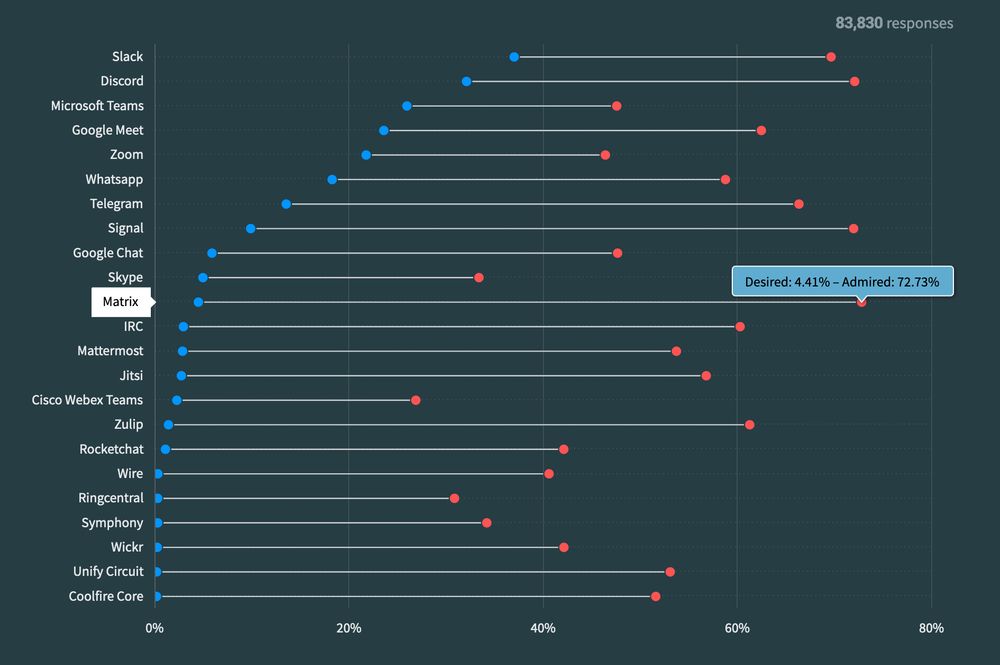
This is of course a popularity contest, but it’s still useful.
Matches my expectations, eg lots of awareness of Microsoft Teams, people that use it hate it. Discord is desired and loved.
As you go down the list, it’s mostly that people haven’t heard of these tools. Zulip is an outlier — those people I know who use it really love it, and that shows up here.
This section is called “Synchronous tools” and this was the prompt:
Which communication tools did you use regularly over the past year, and which do you want to work with over the next year? Select all that apply
Ok, I guess I’ll need to go dig into the Asynchronous tools next. Everything is asynchronous when you’re a multi time zone community or organization.
What's IPFS and how it compares to BitTorrent is an article by Daniel Norman correcting and explaining many of the details about IPFS as a response to a blog comparing the two.
It’s really well written. I should quote pieces of it on my IPFS notes page.
localfirst.fm is a new podcast about local first software development. LoFi as we like to call it.
Individual initiative, corporate inertia and good bad advice
I did my job with love and belief. This was always obviously risky. I had no illusions that the love was returned, or that it is even possible for a public corporation of non-trivial scale to behave in human ways at all.
I’m quoting the first paragraph. I could post any sentence and it would make you think. It’s a long read about working at Spotify, and being fired, and many other things.
New Public made a directory of “digital social platforms”:
The Directory is a list of spaces that have taken at least some notable steps to build a public-spirited user experience, embody at least one of New_Public’s Civic Signals, and/or implement creative new design patterns.
I love the words on the directory landing page. Seriously, go read the intro, it’s great.
I am annoyed that the directory listing is a bare listing of Airtable records.
The Landscape maps made in Figma are much more engaging.
Paul Frazee from the Bluesky team writing on his personal blog about the design of RichText facets that are used to include mentions and links in posts.
And, other custom things that can be defined and read by different clients and servers.
Will the new judicial ruling in the Vizio lawsuit strengthen the GPL?
The TLDR; is treating the GPL as an issue of contract law rather than copyright, and because of contract law, a third party can sue instead of just the author.
Vizio makes smart TVs that use GPL code and they haven’t shared the source.
In October of 2021 the Software Freedom Conservancy (SFC) decided to launch what is believed to be the first significant open source lawsuit based in contract rather than in copyright. Critically, the SFC’s case argued that anyone who benefits from the General Public License (GPL), not just the authors of the software, should be able to bring a lawsuit to enforce the terms of the GPL.
Open source and AI related copyright, licensing, and contract arguments all in one year!
I get a lot of unsolicited business emails as the founder of a company. Yes, this is spam, but it’s the sort of cold outreach where it’s just a “regular” email wanting to sell me consulting or some SaaS service.
There are some that get sent from unbranded Gmail accounts (why???). I’m considering an email filter that ignores Gmail accounts unless they’re in my contacts.
Other ideas on reducing the volume of these types of emails?
HatTip, a set of JavaScript packages for building HTTP server applications. The cheeky tagline is “like Express.js, but for the future”.
From the README, “Server code that can be deployed anywhere: AWS, Cloudflare Workers, Fastly, Vercel, VPS”
I came across a thread by @vkc about doing an experiment of not using big search engines.
She in turn linked to Neil’s blog A week of not using a search engine.
There’s a general rebirth of curated directory sites, and I’m personally interested in community or commons search. I’d much rather get a search result that is in essence a recommendation or at least experience of someone I know.
Flohmarkt, which means “flea market” in German, is a “federated decentral classified ad software using activitypub” aka Facebook Marketplace clone.
Had this pointed out to me via @blaine, as we were chatting about serving real local / regional needs with Fediverse tools.
Many area have Buy Local and other Facebook Groups and Marketplace where a huge amount of community work gets done.
This isn’t the answer as just a piece of tech, but really looking at what is being used and will need to have similar functionality to really be adopted.
Bluesky posted their 2023 moderation report. Their moderation system is codenamed Ozone and they plan to open source it, as well as make the moderation backend self hostable.
Do I want to add Mastodon powered comments to my site? I don't think so. I cross-post to have discussions over on those other systems.
Orbstack for MacOS:
a fast, light, and simple way to run containers and Linux machines on macOS. It's a supercharged alternative to Docker Desktop and WSL, all in one easy-to-use app.
Free for non-commercial usage, $96/year per business user.
The future is not Docker, but containers are.
We started building Depot back in January 2022 to solve our own pain of living with slow Docker image builds in generic CI providers like GitHub Actions, Circle, etc. We were annoyed by having to save/load layer cache over slow networks, the lack of larger managed runners, and having to rely on slow emulation for multi-platform or Arm image builds.
Fedica has an updated page describing how they handle cross posting RSS feed items. With many more networks at play, teams like Fedica are going to be updating how cross-posting and other aspects work. It's hard to normalize across all these systems!
the web starts to feel a bit like one giant website, that’s so fast it’s just… part of your computer.
@duncanlock@cosocial.ca talking about the Dillo Plus browser with user stylesheets.
Polar.sh is like a Patreon optimized for software creators that use GitHub. Newsletters, subscriptions, and issue-based funding. The platform itself is open source. Business model is 5% of funds transacted.
CasaOS is a home lab management app. Storing & syncing between commercial data clouds — GDrive, Dropbox, etc — is the starting point, also installs apps via Docker containers.
depp, a static page generator for git repositories.
via @aw@merveilles.town, who has an instance running from a home lab.
Write up by Molly White of her migration from Substack to self-hosted Ghost. She moved to a Digital Ocean droplet and spent the most time configuring DNS and email / Mailgun settings.
I added some notes to my Ghost note.
Check my Facilmap for storing bookmarked places.
I'm taking notes on building Boris Map using Facilmap: a privacy-friendly, open-source versatile online map that combines different services based on #OpenStreetMap
You can self host it. This feels like another good option for Cloudron.
Go read Kharis O'Connell's article, The Glimmer
All this Spatial Computing hype about to start (again!)…I can feel the frenzied frothing-at-the-mouth-need-for-a-gold-rush building in the tech industry. It's probably a good time to repost my Spatial Computing article from last June
#SpatialComputing
Just saw that Meetup was acquired by Bending Spoons. This is the same company that acquired Evernote.
For me, Meetup is the epitome of platform capture. I won't use it for anything I organize. Luma is what I use, but just for RSVP / attendance, and I can export email as needed.
Stats from Appfigures show Flutter as #2 SDK on Android / Google Play, and #4 on Apple App Store.
Welcome to the year of tiny hardware experiments. Just bought a refurb Lenovo M900 Tiny for $179CAD.

Rally is open source, self-hostable "pick a date or time to meet" software.
I've created a note page for it locally with some more details, like their suggested social obligation to pay the equivalent of one year managed hosting if you host it yourself.
#CloudronApp #selfhosting #CommonsFunding #AGPL
Just launched at CES, the Rabbit Tech r1, "your pocket companion". A $199USD hardware device with screen, camera, analog scroll, push-to-talk mic, usb-c, sim card.

I pre-ordered and put together a Rabbit Tech notes page.
I'd like to see web hosting look much more like installing an app on an iPhone.
This is at the end of Ben Werdmuller’s response to Giles Turnbull’s Let’s make the IndieWeb easier.
I couldn’t agree more. This is part of the deep dive I’ve been doing on Cloudron and similar Bring Your Own Server management systems.
More generally, I’ve been concerned with the practices of open source software builders. There is very little Design for Deployment that makes it easier for less technical users to self host.
I think open app stack packaging formats like Buildpacks is a good direction.
Papermark is an open source Docsend alternative. Hadn’t realized Docsend is now part of Dropbox. GitHub optimized for deploying on Vercel is here https://github.com/mfts/papermark
Linear App: Settings are not a design failure
thinking goes that as designers, our goal is to create product experiences that don’t require any adjustments by the user. Consequently, offering customization options is interpreted as a failure to make firm product decisions. … First of all, remind yourself that users love settings.
I have continued my Jekyll Liquid crimes by using replace to make all the images and notes full links. Journal RSS feed code on Github
Andy Wingo, Missing the point of WebAssembly and offers his own starting point:
WebAssembly is a new fundamental abstraction boundary. WebAssembly is a new way of dividing computing systems into pieces and of composing systems from parts.
Wingo is a compiler engineer working at Igalia, on Mastodon at @wingo@mastodon.social.
BackYourStack is a project started by Open Collective which can scan your code dependencies and show which of them have Open Collective accounts.
All of the code of both projects are open source.
Coolify is another self-hosting server management system (via @depatchedmode).
They offer cloud hosting of the admin panel starting at $5/month, which then manages your other servers for deployment to.
Linux Desktop on your Android Device at Android Authority covers Debian NoRoot and UserLAnd (Ubuntu and other distros possible).
The average estimated date for when AI could beat humans at every possible task shifted dramatically, moving from 2060 to 2047—a decrease of 13 years—in just the past year alone!
As I think about what subscribing / following / integrating other people’s notes looks like, I found this example from Rui Carmo’s Tao of Mac.
It says “This wiki page is a stub”. It’s also integrated into his main feed.
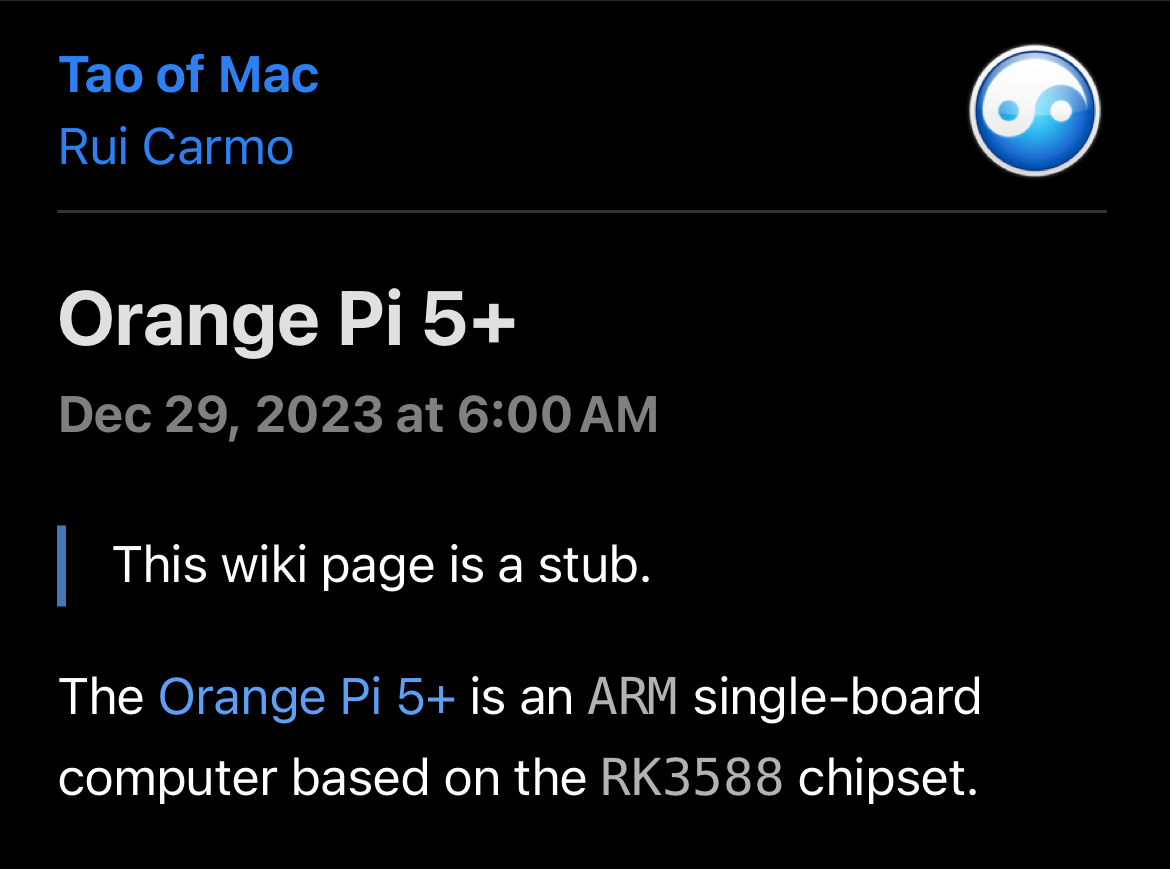
I use Littlefoot to make inline footnotes1. Turns out NetNewsWire includes similar functionality.
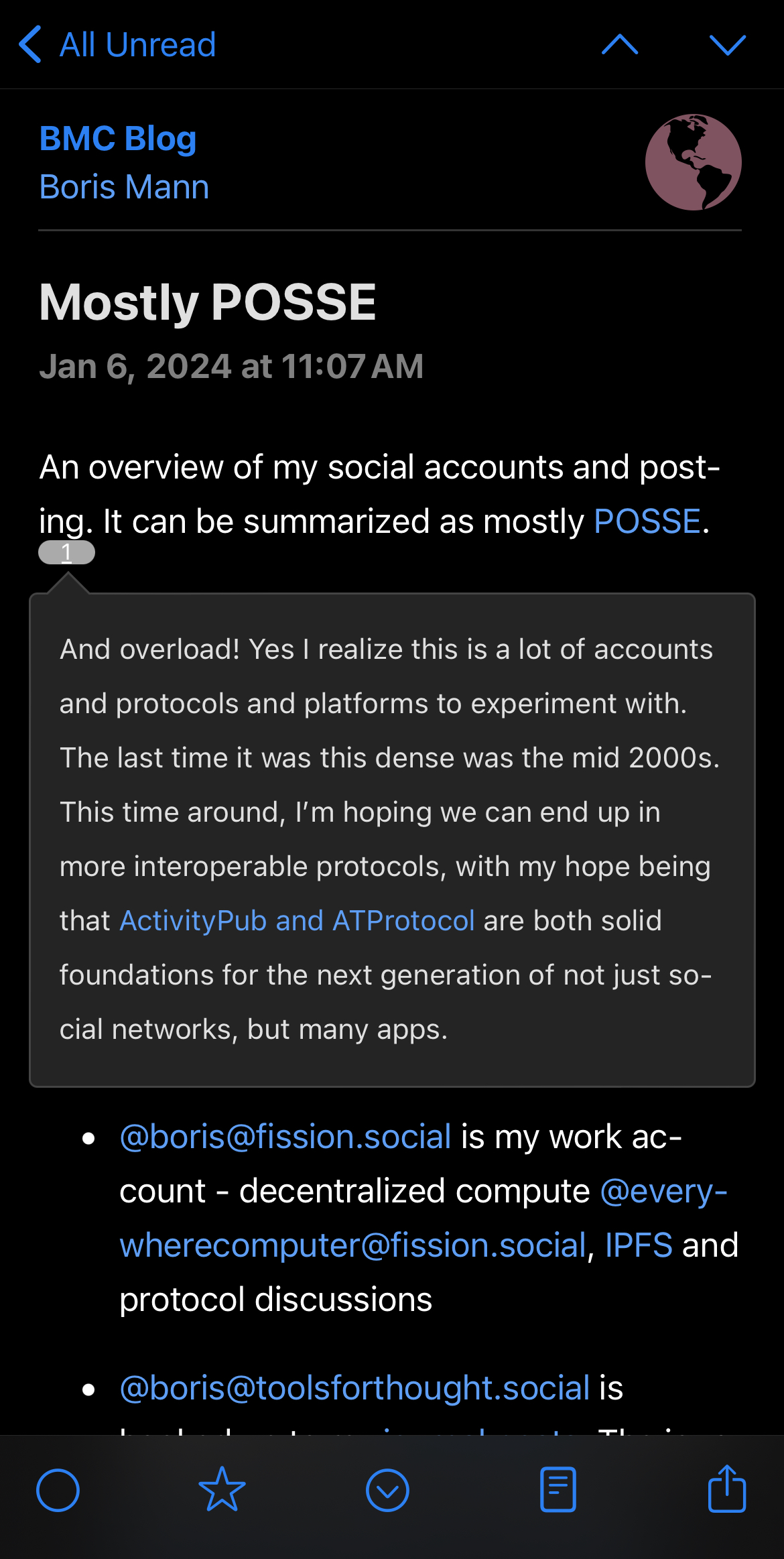
-
Footnote demo ↩
ZEISS is launching smart glass at CES and talks about holographic displays and switches. And apparently a transparent camera aka “holocam”
With so many different networks and accounts and crossposting, I find myself thinking about rebooting Moa Party. I’d actively run it as a collective of some kind.
I’m going to be talking more about Noosphere, so I better get its note page here setup.
I’m an early beta user of the Subconscious iOS app that uses Noosphere as its backend.
Your online persona federated Have your domain name be followable by anyone on the Fediverse, be it Mastodon, Firefish, Akkoma, or any other federated social media platform.
Get Federated is new thing by Sal Rahman @manlycoffee@techhub.social - sign up to get notified!
There are no ushers on Mastodon. There's no one paid to show you to your seat, no one whose job it is to ease you into comfort and remove friction.
There are no ushers on Mastodon by Les Orchard from back in November 2022.
I’ve been recommending UniFi routers for a while. Turns out there’s a new UniFi Dream Router that’s $266CAD and is the replacement for the $400CAD UniFi Dream Machine . Recommended!
Everyone loves a notes graph! Shout out to the Digital Garden Jekyll Template once more.
It turns out that I had previously done an experimental import of LogSeq into this site template. I probably even have some notes somewhere.
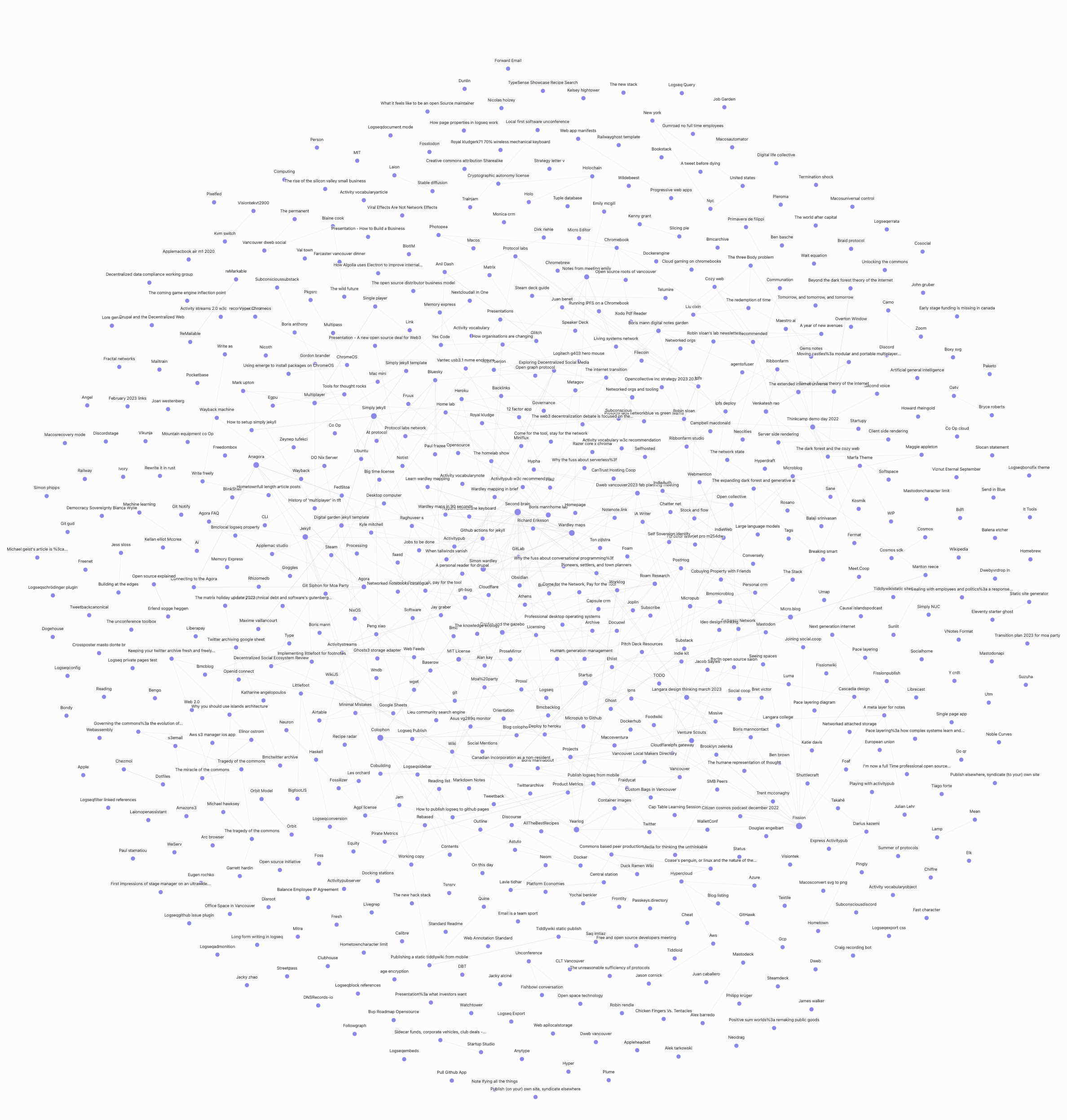
TLDraw has changed its license to non-commercial. The founder Steve Ruizok dropped a note in the Cloudron forums saying that Cloudron may not be in compliance. I left a comment, as there are a number of apps with different licenses, and e.g. me running TLDraw on Commons Computer is not running it commercially.
Jake Lazaroff argues that “website vs. web app dichotomy doesn’t exist”. It’s a good article, develops a framework for thinking about different types of web properties. Mentions Local First, CRDT.
But to me, it does show a clear split of document web vs app web.
OK, one more quick hack to the Journal feed.
Relative paths for images are a problem. Maybe they actually aren't for many modern feed readers. But they ARE if I want Micro.blog to crosspost correctly.
Found this hack to use the Liquid replace filter to look for src tags and then add in the full path to your site.
I'll test it tomorrow by posting an image. Time for bed!
Added the journal feed in the link header of all pages so it can be auto-discovered.
Pleasantly surprised to be digging into the IPFS _redirects spec. I guess I can just point to my old archive! /archive/* https://2023.bmannconsulting.com/archive/* 301
Made a BMC page where some TO DO stuff will live.
How many times have I ended up using this JSON Feed#Jekyll JSON Feed Templates? Many times! The special treatment for link front matter has me thinking.
Decided to not mess with feed format right now. It's working, let's use it for a bit, and see how various things look once they cross-post through Micro.blog to Mastodon. Where it's actually putting content on my under-used @boris@toolsforthought.social account.
Added a Journal layout template.
- Removed LogSeq note site links
- Added tag display from blog posts layout, which links to
/notes/tag(but can't tell if it exists or not, so might 404) - Added via link to the sidebar
- Used Link as the title if it exists
And I guess this will be a test of what large journal cross-posts do!
Update
Got Redirects working correctly! So https://bmannconsulting.com/blog/2021/02/13/drop-in-audio/ should redirect to https://2023.bmannconsulting.com/blog/2021/02/13/drop-in-audio/ (same theme, so won't even look that different).
And cross posting of large posts works just fine, with a link back to the post. Nice!
Building SLCs - Simple, Lovable, Complete - features, rather than MVPs. Pronounced “Slick”.
Trimming NetNewsWire RSS subscriptions and ironically found RSS Parrot - “Turn Mastodon into your feed reader”.
Reminds me of Darius’ RSS to ActivityPub Converter, which I want to look into deploying as a CoSocial service.
One more journal post! Micro.blog lets you add multiple feeds, and you can set custom cross posting for each feed.
This means I have connected the Journal feed up to my @boris@toolsforthought.social account.
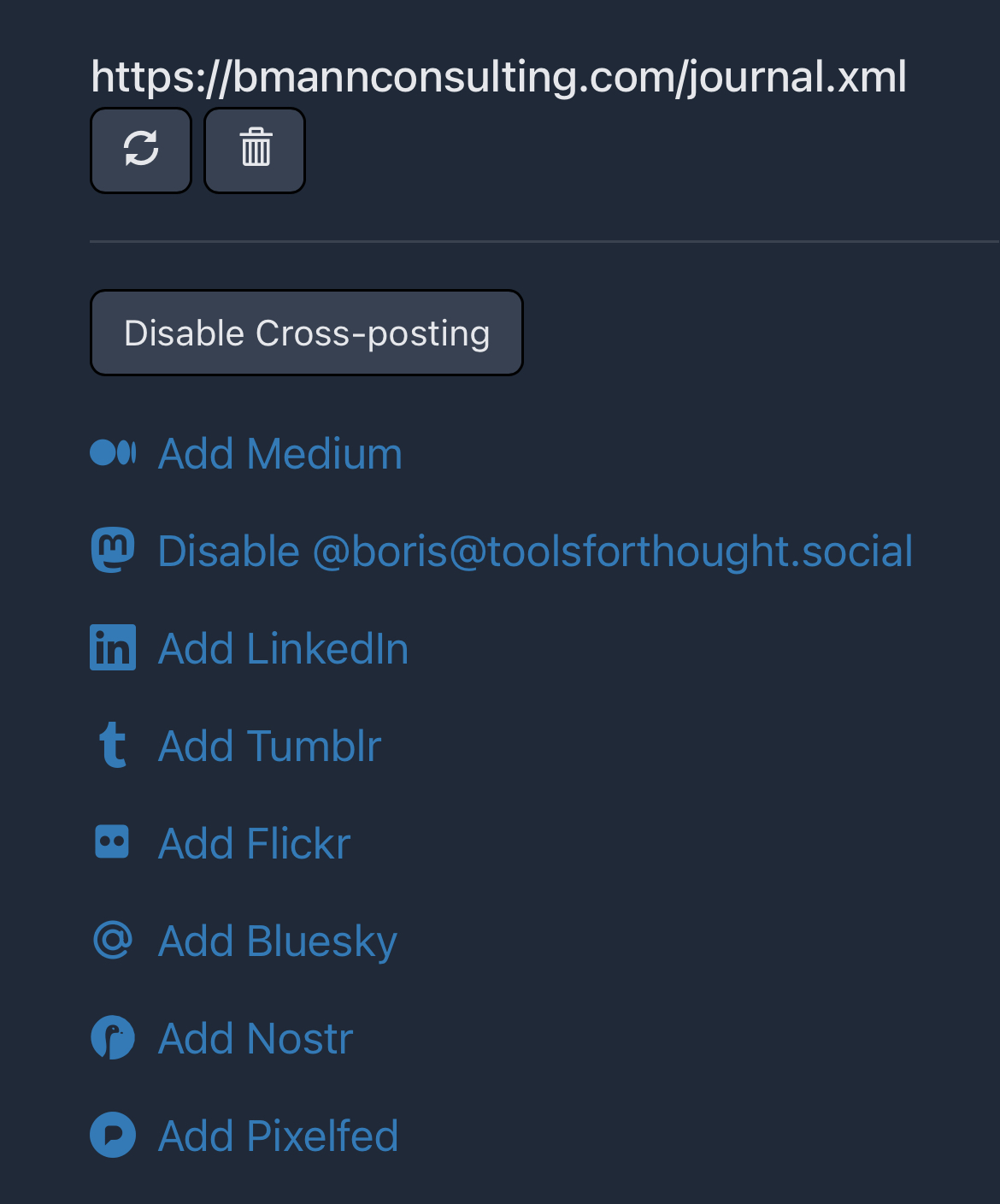
Ok, final post of the day now that I’ve learned about Obsidian nuances with Daily notes vs Unique note creator.
I do want to open up a Daily note when I open. But, I want to just use the same format as the Unique note creator so all the files have the same format.
As it turns out, because I made unique page names with a timestamp, the daily journal button effectively becomes a new unique note creator!
The Liquid template for the Journal page then loops through and groups all the posts by day, so you can read them all together, but with permalinks for each one. You can see it in action on the Journal page.
I think it looks pretty good! Maybe even interesting enough to put on the home page?
Hosting capacity as a measure of agency
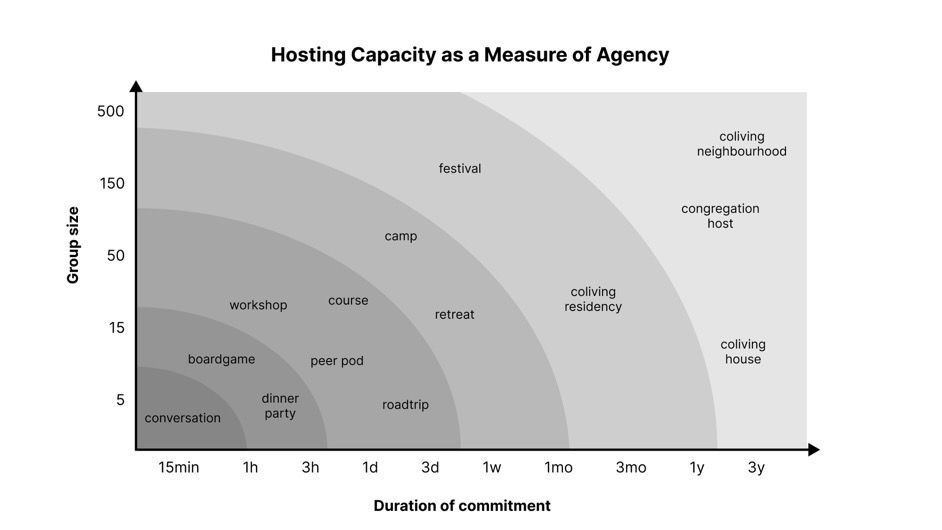
I drew this diagram to illustrate a lot of related insights about agency, hosting, community-building, collaborative leadership & social change
you can use this map to self-evaluate your level of agency: where are you currently? what group experiences do you feel comfortable to host? what feels very doable? what would feel like a tolerable stretch? what would be overwhelming even to attempt?
Oh right. Obsidian uses moment.js formatting, and Liquid's date filter' uses strftime. And strftime isn't going to give me pretty 1st days as far as I can see.
Co-op Cloud came up in discussion at CoSocial today. I'm porting in their Co-op Cloud Alternatives too.
I set up Working Copy so I can use Obsidian on my phone with git syncing / publishing. I always forget the order of steps.
- Make Obsidian vault on mobile
- In Working Copy, clone the git repo
- Looking at the repo in Working Copy, click on Repository / Status and Configuration
- Click on the disclosure arrow for the repo title, select Link Repository to and select Directory
This "day" should have two other entries, with YYYY-MM-DD_HHmm titles.
I seem to keep having trouble finding Boris Anthony’s libra.re web eBook project. Now I have it.
I point people at Robert Merki’s Wildcard definition often enough I should have an entry here.
Using Obsidian to edit my Jekyll-based site. I want to add journals back in, and maybe move to Eleventy, and maybe add IndieKit.
What are the latest Micropub Client apps?